#this also connects to how much influence adults have over teenagers in fandom
Note
Hey TAJ! This is unicorn anon 2.0 lol, hope you're doing okay and enjoying Festa/comeback activities! I had a few reasons for popping in. First, I just wanted to say I love your last handful of posts! I'm envious of how you can make your points so concisely. Also wanted to say I'm sorry you've been getting so many troll anons lately. Fandom spaces can be exhausting enough without people actively making it worse. As a Taekooker it just frustrates me so much to see other Tkks in here, and on other blogs, being assholes on purpose. I'm sorry it happens to you so often.
Finally I was curious about your one reason you could see for Taekook dating (sorry if I'm butchering the way you worded that -- I know that you don't actually think they are haha) but of course I totally understand if that's not something you want to get into here!
Anyway I hope you're doing well and having fun with all the new content! -🦄 2.0
I'm so delighted whenever anons make use of the tags I give to them. 😂 Hello, unicorn 2.0! (Although I could swear you were the OG—the way you write sounds like the OG anyway... help, let me know if I'm wrong!)
Similar to Jikook, if I were a Tkkr, I would focus on the overarching dynamics between Taekook. Already we're seeing people lose their minds over them sitting next to each other or Taehyung wanting to go get a tattoo with Jungkook, but those are... non-reasons to me. 🤷🏻♀️ That's not to say that none of these things aren't cute because they could be, in the same way that Jkkrs find joy in Jikook sharing a car. It doesn't indicate anything about their relationship, but it is a shipper-oriented moment (I feel like this distinction is crazy important).
(The rest behind a cut because this is pretty much the antithesis of my usual content. Subject yourself to it if you want.
Disclaimer: I am not a Tkkr. I can't stress this enough. If you're a casual passerby, please take note of this.)
The so-called overarching dynamic between Taekook that I've observed thus far is arguably mundane, but I would cite the fact that they have reconnected and it shows. I think when you compare their dynamics pre-ITS1 vs. now, they've clearly bridged whatever social awkwardness they had before. I wasn't around when BTS debuted and as far as I know, everyone could agree that Taekook were closer, but nowadays I imagine their friendship has risen from the ashes, so to speak, as an ode to what they had as young teenagers. But now they're adults, and I would probably explore what that could mean.
I've also noticed that Taehyung and Jungkook are both exploring their interests and hobbies, trying out new things, etc. In everyday life, people will find it a lot easier to connect with someone whose phase in life is seemingly running parallel to theirs.
So if I were a Tkkr, these are the dots I'd latch onto and run with because it makes the most sense to me and has the most potential to cultivate that Taekook angle I would hypothetically want to develop.
Thus begs the question I may get in response to this: if you can see this, why aren't you a Tkkr?
Because their micro dynamics suggest to me (using my own knowledge of human behavior, which can sometimes be influenced by my own experiences and personal opinion) that their relationship is ultimately platonic. I personally think Taekook is quite similar to Jihope in terms of closeness.
Any Taekook moment I've witnessed doesn't particularly look invasive or awkward third-wheeling, especially after taking into consideration their culture on skinship. Jikook, by comparison, often flirts with that line of what's considered "normal," which is why they interest me far more than Taekook does.
This isn't me trying to dismiss Taekook. I just don't see them in that way and I never have, but I can certainly pick out things that can be used to begin a narrative that sounds the most logical to me. The practice itself isn't hard, and I can do the same for all the other ships quite easily, and I still wouldn't consider myself a shipper for those ships either.
9 notes
·
View notes
Text
fandoms & growing up
Soo. I am not really sure if that will make a lot of sense, but I think I'm now kinda able to verbalize these thoughts and feelings I've been having for well over 2 years and it would mean the world to me if there's someone who can relate to that.
So, as a lot of tumblr users, I got into fandom culture pretty young (like 11 years old). And at that age, you get easily influenced by everything and your mind just fixates on stuff. Like Books, YouTubers, Bands, etc. And as a child, I spent all my free time either consuming content about that thing I was obsessed with, giving other people an hour long rant about that thing, or search the world wide web for people who also like it.
I am person whose most important thing is human connection. I strive for it, I change myself and lie just to receive it (I'm working on that part dw), but I still never was really popular and always felt like an outsider kinda.
But back then it didn't matter to me (I was even proud of it), because being in those fandom groups gave me such a strong feeling of belonging and security, that I didn't need outside validation, I was being appreciated just for liking the things I did. I didn't care that people found me cringe, that I was maybe a bit of a nuisance by screaming "(ship) is real" or singing along to pop songs with their respective tumblr parodies, because the people in my phone thought I was cool and funny and that's what mattered to me.
But then, creepingly, something changes. And you cant really put a finger to it until its too late. Its normal that certain group chats go silent, but you just go look for new ones. Its normal your interest in something starts to fade, but in a week you've got a new show that you're obsessed with and the circle repeats. But searching for new groups becomes less and less a priority in the mess that is your teenage life with new responsibilities and dreams, and you become less obsessed with stuff and over the years you become just a normal enjoyer. If you happen to join fan groups, you loose interest pretty quickly. Talking only about that one thing is boring, people now need more than the same interests to become a friend.
The less internet friends you have, the more you look around yourself in the real world. And while you were so caught up in the magical world of your laptop, others made solidified relationships, went to therapy and overcame their mental illneses, and assimilated to start a good life as an adult. And xou dont belong. You feel alienated, dont really know how to do it like them, and because you didnt care about how you presented yourself, your reputation is already tainted.
(Which is fair in my case, because if I met my previous self I would find her cringe and annoying and overbearing, too)
Now you kinda dont belong in either world. You'd love to go back to your previous stuff; completely loosing yourself in something is such a freeing experience- concentrating your energy on that one thing while also getting a strong sense of community. But somehow you're unable to now, you have so much stuff to concentrate on, so many worries, you're too self aware to run away from your mental problems now.
So you look for community in the real world, but everything there seems too boring for you, you hate talking 24/7 in a moderate way about relationships, school drama, jobs, health stuff. No excited rambling, no ones eyes lighting up when the get to talk about their obsession. But you are also too boring now to be in fan groups or the be friends with people who are unapologetically themselves, because suddenly you care about how people perceive you.
And now it just feels like somethings missing. You always swore you would never be like those adults, who didn't have any strong feelings anymore, just moderance, but you get just like them. You don't get mad anymore if someone disses your favorite show or ship. When people ask you about it, you don't give them a 2 hour rant (powerpoint presentation included), but a short, 2 minute summary, because you know now it might not be interesting to them.
And suddenly you binge cringe compilations, which often consist of fandom people making questionable posts or those who think theyre half animal (not furries, I think they call themselves therians?) and you're like "damn cringe", but really you're super jealous because those people, have something they're super passionate about and put themselves out there. And you feel sorry for being such a hater bc ultimately it doesn't matter if someone runs around on their fours and hisses at people, as long as they're nice.
I mean I still try to seem like my old self, I wear a backpack with anime and meme pins, I start rants, I wear merchandise. But my hearts not in it. I feel self conscious. But I don't know if that's because that identity doesn't fit me anymore, or because Im too insecure and want the rl people to find me.
If I lived in a big city, stuff would be different. There would be rl fandom meetups and I could just look for community easier. But I live in an extremely rural area, I never really fit in here, the internet was my save haven. My school is an hour away, but still really really rural. No fan stuff. Maybe a few people who also were in fandoms, but also kinda grew out ig. I tell myself, when I move away, I will finally find people I belong to. But maybe I've became too boring, too judgy for those people.
For example, Ive always felt drawn to people who dressed really alternative like goths, but I think they could see how insecure I was, how my desire to be liked by everyone often became toxic, and stayed away. Maybe its the same way when I finally get away from here. Will I be able to commit to being with people out of the stupid norm again even though people will find me cringe, and not include me in their social circles? Idk.
And I long for the community I felt back then, made a tumblr, started reading Homestuck bc it was such an internet phenomenon. But I'm only a bystander, I dint have any rants to post about my favorite shows, and while Homestuck is an ok read, I cant nearly get into it as all the others did that read it.
Maybe Im too grown for some stuff now and that makes me sad. I never really tried to be like my fav anime character or roleplayed as them, all things that would make me feel cringe and also kinda bored now, but I wish I had experienced them. I wish, even in my fandom times, I wouldn't have been so insecure to express myself. And now its kinda too late? I am so envious of everyone with cringey phases they can laugh about now, I don't have many because I was too afraid. And Im still too afraid even though I act like I am not and idk.
I just wish I was like 13 again.
tldr: I wanna be cringe gain without fearing others opinion but I'm too self conscious and adulting this that I wanna be a child again cry cry
1 note
·
View note
Text
ok. so I know that I didn’t like the starless sea. but for some reason, I feel like because everyone seems to love it, I have to as well. like I had legitimate issues with it; I didn’t just not enjoy it. I could probably write a pretty coherent review about it. but every time I see someone raving about it, I feel like my assessment has to be wrong, especially when an adult is the one reviewing it. which is definitely a problem lol
#this also connects to how much influence adults have over teenagers in fandom#like even though I am VERY confident in my assessment of the book#every time I see an adult post something that is complimentary#I think#oh well I must be wrong then#before I catch myself#and i'm obviously not telling adults what to read or anything#i think the starless sea is adult anyway (not sure tho)#but it's just very telling that an adult can have that much power over a kid unknowingly#teens (at least me) subconsciously trust adults a lot (older = wiser etc)#so adults taking over ya fandom spaces is dangerous!#ik a lot of people talk about this#and ik this is in the tags lmao#maybe I'll make a full post#but yeah#anyways with this specific book I think it's just a problem with my own self confidence#plus it's adult#but with ya it's dangerous bc there are kids a lot younger than me and a lot more susceptible reading that genre#and being told by adults that some very not ok things are ok#anyways this got super long sorry lol
10 notes
·
View notes
Text
Many people have talked about the parallels between Zuko and Katara and I don’t know if I’m saying something new since I’m pretty new to the fandom, but I’ve yet to see a post on the parallels between bloodbending and lightning bending.
Both are extreme, rare (and extremely powerful) forms of bending that are only used in dire circumstances, and both have dark connotations. Both are also connected to how Zuko and Katara are victims of violence within their respective narratives.

I’ve talked quite a bit (and other people have as well) about lightning and how both Ozai and Azula use it against Zuko, and how Iroh teaching him how to redirect it is paralleling the ways in which he teaches Zuko how to heal from that abuse without letting it destroy him.

Hama is in a lot of ways Katara’s dark Iroh, and in a direct contrast to Iroh’s compassionate guidance of Zuko, Hama attempts to corrupt Katara by teaching her ways in which waterbending can be a force of destruction and death. What she does to Katara is especially cruel because Katara trusted her and was vulnerable, and she twists this girl’s trust and yearning to learn about a heritage that was stolen from her, and uses it for her own ends.
Whereas we learn in “The Firebending Masters” that the firebending that Zuko was learning from Iroh was actually the true source, rather than the Fire Nation’s corrupted form fueled by anger and hatred, and whereas Iroh taught Zuko how to draw wisdom from more than one source, Hama is so consumed by her hatred of the Fire Nation that she imparts her own trauma onto Katara. Hama is a character who begins with sympathetic motives but who ends up committing violence against innocents and abusing the trust of a young person in her care, whereas Iroh was once responsible for a great deal of violence and destruction and could have transferred his own pain over losing his son onto the hurting teenager in his care, but instead did everything he could to protect and guide him. Whereas Hama forces Katara to bloodbend and uses it against her friends in front of her, Iroh doesn’t teach Zuko how to use lightning himself and refuses to use it against him.
Katara learns to bloodbend but is devastated by it and swears to never use it against others, although she is compelled to use it twice, once out of extreme emotional stress in a confrontation with her mother’s killer and once to save her friends.
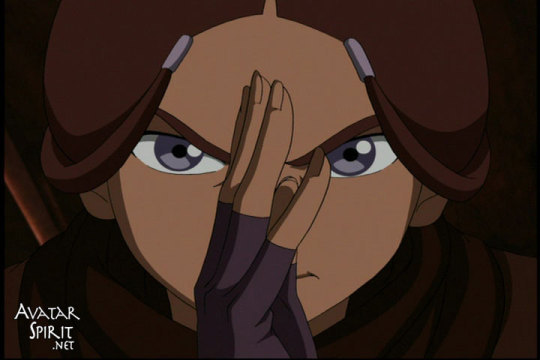

Zuko is also forced to redirect lightning twice, once when confronting his father in his own emotional scene against the person responsible for taking his mother away, and once to save Katara.
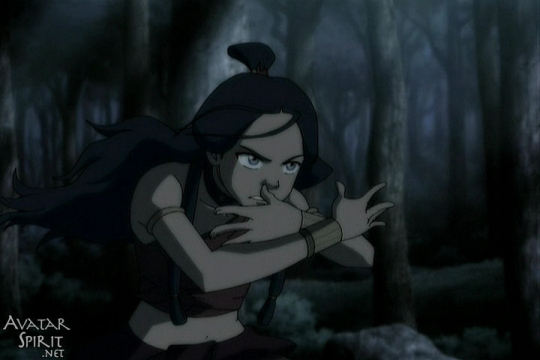
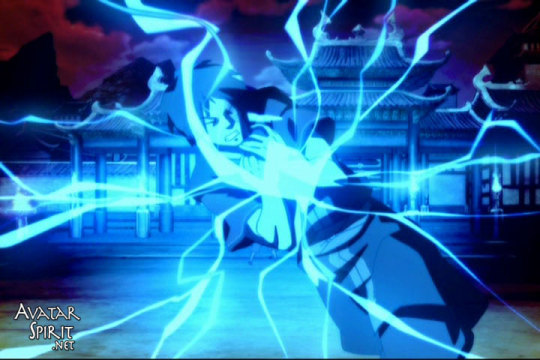
This is a fascinating narrative parallel that says a lot about the cycle of violence and its ability to scar the young generation of kids who are left to deal with the trauma they’ve inherited from the adults who influence them, for good or for ill. Zuko ends up literally scarred and almost dies trying to protect someone else. Even as he redirects it, he can’t totally prevent Azula’s lightning from striking his heart because his relationship with her is much more tragic than his relationship with Ozai, as in the end they were both victims of their father’s abuse. Similarly Katara has to bear the knowledge of bloodbending, which is so tragic because Hama herself is a tragic figure, one who was horribly victimized in a way that Katara can relate to on a very personal level.
172 notes
·
View notes
Text
My Two First Loves - How Will it All End? - Part 1 Mason Jennings.
This isn’t necessarily a complaint. I’m genuinely curious as to how long this book will be, especially considering we’re 60+ chapters in. Is this going to end when MC graduates? Will it end when she finally choses between three people? I assume it’s the latter.
But here’s some of my thoughts of what I do know while we’re all waiting. The more I wrote about this series, the more I had to say and if I’ve caught your attention so far, indulge me with another few minutes of your time.
Originally when I read the synopsis of the first chapter, I remembered thinking to myself ‘this looks like angstville and I am soooo ready’. I love angstville, hell I vacation there and if you’ve ever read any of my stories or have been in the choices fandom for a while; you may have stumbled across my blog. You’d notice I’m a complete sucker for this type of pain genre. And in terms of angst, the first few chapters didn’t disappoint. The writing, while it never always felt natural – this kind of style sometimes gave me a familiar heavy feeling in the chest I’ve come to associate as a local in angstville.
From the very beginning, the reader is under the impression that MC has a crush on Mason. It’s a crush that’s spun years and the book keeps up this narrative throughout the entire story. (I’m sure there are people who headcanon this differently, but I’m strictly speaking about the intention of the book and for plot-related reasons, I understand why this makes sense). Then we meet Noah cue bad to the bone song, a secondary character MC starts developing feelings for; soon after MC finds out Mason is dating her best friend Ava. The book basically revolves around these four people - MC, Mason Noah and Ava. It’s not a fair representation all around, but I will say this book does a fairly good job of portraying the woes of being a teenager. To MC and everything she goes through feeling larger than life. To Mason struggling to push himself out of his father’s shadow. To Noah proving he’s a good soul that was dealt a bad hand from the deck of cards we call life. To Ava who was trying desperately to be what she thought she had to be and hiding who she truly was.
First and foremost, I wanted to breakdown a list of all my thoughts, and coordinate them accordingly. I’ll be going through the pros and cons in a series of posts, a lot of which deals with identity and character development. Bare with me if you have the patience, I also wanted to make a TLDR version of everything for people who just want to get to the point.
In any case I wanted to cover the main characters and how they’ve changed over the course of the book through these specific topics.
Mason Jennings Character Development
Noah Harris Character Development
Ava Lawrence Poor Character Development
MC’s Development and Family Dynamic
Since Mason is the first topic I’ve written down, let’s start there.
Mason Jennings: The Childhood Crush
Mason and Parents mostly Mr. Jennings
Mason and MC
Mason and Ava
Mason and Noah
Future Mason: Where Does this Leave Us?
The story does a good job of giving you background information about Mason Jennings almost from the very beginning. Although some of his deeper and more meaningful moments with MC are buried in diamonds scenes - you get a pretty good sense of his character. Mason is popular, friendly, albeit the rich kid with undertones of short sightedness as well as father-son issues that hugely impact his character over the course of this book. Because of his upbringing, Mason sees himself as the ‘good guy’ and while we can certainly see moments of this in the story, we also see moments where he’s been insensitive and selfish. Ultimately, Mason’s short sightedness is his Achilles heel.
Growing up with a lot handed to you on a silver platter makes it a little difficult for Mason to be open minded. Like most of the students of (whatever the name of their high school is), he’s quick to write Noah off as a bad influence on MC. Granted, he knows more about Noah than MC at the start, his unwillingness to change his perspective is a hindrance to his growth. It is unclear if Mason was always well off - considering his exchange with MC about his house and the jacuzzi (if memory serves me correctly), however what the reader does know; in comparison to Noah Mason’s parents haven’t struggled to make ends meet. In public, it looks as if they are a happy family but behind closed doors, it doesn’t take much to assume Mason’s life in reality is far from perfect.
Regardless, this cookie-cutter presentation makes it hard for the reader to sympathize with him, especially when comparing him to Noah.
Mason’s Parents
It starts with his upbringing. A lot of his life, Mason was groomed to be like his father; he’s supposed to follow in his footsteps by scoring a football scholarship. He’s supposed to have a full ride into the air force academy. He’s supposed to breeze through school, listen to his parents and survive high school. Though his cookie-cutter life starts falling apart during dinner with his parents and MC. His parents make a lot of comparisons about MC and Ava, when they bring up his new relationship ( much to MC’s discomfort and Mason’s). Because of Ava’s accomplishments they think she’s a perfect match for Mason and uses this to discredit and sort of look down upon his friendship with MC. They think Ava is the best and most optimal choice because they’ve always given him the best and expect the same in return. It’s implied during as this happens that their relationship isn’t perfect, Mason’s uncomfortableness isn’t just on behalf of MC, he’s embarrassed despite a part of him thinking he owes them for everything they’ve ever done.
Another and more obvious example stem from the all-important football game everyone was looking forward to. Scouts are visiting and their school wants to showcase the best of the best. This spurs even more competition between Noah and Mason; not only for MC’s affection but to gain the scouts favour. Regardless of the outcome, Mr. Jennings influence as the principal allows him to pull the strings and guarantee approval for Mason over Noah.
Immediately after Noah confronts him about the entire scenario; Mason is quick to defend himself and his dad; saying it was his talent they cared about and not his father’s connections. Mason spends so much time thinking the best of his father that he doesn’t consider any alternative. Despite it being obvious to the reader that there is more going on here than just Mason’s ability to play football; he doesn’t entertain the thought. And from his perspective why should he? We’ve already established his parents try their absolute best to give him the best chance possible, which doesn’t necessarily mean playing by the same rules as everyone else.
It’s these kinds of examples that shows Mason’s short sightedness. This makes him a lot less likable. His unwillingness to see other people’s perspectives outside of his own makes him fall a little short. He’s so averse to the idea that his father could be the reason why because it would undermine his own confidence in himself and ultimately change the way he sees his father.
Recognizing how important character growth is in young adult stories; this reoccurring issue has started to change. With the help of Noah and MC’s influence, Mason is finally staring to realize his father isn’t infallible after all. They get into a full blown argument over spending time with MC where they don’t see eye to eye, and haven’t for a long time. Ultimately, Mason starts questioning his own future. Does he genuinely want to go to air force academy? Or was that just an idea planted in his head from the very beginning? Is that his dream or his dad’s?
In a more recent chapter; it’s again implied how strained Mason’s relationship with not just his father but Mrs. Jennings as well. He makes a comparison between how his family celebrate the holidays different from the Price family. MC’s family has movie night and this time they’re watching Die Hard because Noah hasn’t seen it before and technically it is a Christmas movie. While this is the first time it’s specifically mentioned to the reader, we get the sense that movie night is a common occurrence around the holidays. Mason mentions how much this means to him; especially when his own parents do not celebrate the same way and he’s always invited over. It’s a special moment that feels a little less special when he sees Noah standing at the front door of their house.
Truth be told, I don’t think Mason has any idea what he really wants, since realizing air force academy isn’t as much his dream as it was his father’s. It is another part of his personality that spills over in other parts of his life. He didn’t know what his own feelings for Ava was, and how deep his feelings for MC truly is. This leads me to point number 2 -
Mason and MC
Whether you’re a fan of their friendship/relationship, the book gives you ample background information to outright say Mason is MC’s childhood crush and it’s the same the other way around.
If you’ve played some of the diamonds scenes like I have, their relationship seems a lot more natural than meets the eye. Although without these scenes, their dynamic feels a little more forced and a lot less like MC has any control over her decisions when it comes to him. I wished some of the diamond content was given for free because they show a lot of good Mason and MC moments. Their inside jokes, the little moments of childhood joy they experienced together like tarot readings with MC’s mother, and reminiscing over other old memories. You could argue its platonic, the small touching gestures; even their concern over each other’s behalf – it’s been this way since they’ve been kids. They’ve always been there for each other – no matter what. It’s that kind of friendship which allows them to be comfortable around each other. And it is that comfortableness that could lead to intimacy. It doesn’t take a lot for a reader to think then; they’ve been in love with each other since childhood.
MC’s influence on Mason has changed his behaviour. From the way he perceives Noah, to his relationship with his father – if it wasn’t for her, I daresay some of his growth would never have happened.
The more softer side MC sees when it comes to Noah, the more she implores that on MC. Noah can’t be all bad. That slowly becomes been her mantra and while Mason doesn’t agree outright; his opinion of him does change.
The trouble is, Mason has a secret about Noah that not even MC knows. He uses it as a reminder in justifying every harsh thing he’s ever said about him. Every harsh thing other people say about him in general. In Mason’s mind – Noah is fooling MC the way he fooled him last year when Noah tried robbing his house with his brother Elijah. Again, this is only half the story and it isn’t until later chapters that the reader starts getting the full picture.
Putting that aside for now and to paint an even clearer picture; during the scene where three of our major players were stuck in the gymnasium together; they’re in a situation where they’re forced to talk when they otherwise wouldn’t. As the reader you’re able to discern from their dialogue to their non-verbal cues; this dynamic is changing and for the first time - they were talking, laughing and being simply friends which before now was unthinkable to Mason.
He did the unthinkable with his father in a much similar manner. Before MC started questioning her own perceptions of what it meant to be a good person and sharing pieces of this would Mason, he would never think to go against his father. At least, not publicly. I think it’s natural for teenagers to disagree and sometimes go against with their parents to some degree, but from MC’s perspective Mason never really did. It wasn’t until MC and Mason were caught being out very late; Mr. Jennings for the second time tells his son MC is not a good influence on him. This is the nicest way I can put it, but with his growing animosity towards MC, this places a strain on their relationship that is too much for Mason to ignore.
This is a turning point in which Mason starts coming to his own conclusions about his dad. They aren’t in a good place; if Mr. Jennings can’t accept MC in his life, if he can’t accept the decision Mason makes – he’s going to lose him. This short sightedness is starting peel away with more and more layers of Mason realizing nothing is black and white, least of all people.
Even if you aren’t convinced of MC’s feelings about Mason, from Mason perspective he’s absolutely head over heels for her. And it is the same feelings which allows MC to influence him, to change him more than he probably realizes.
Mason and Ava
Oh, boy. This was a recipe for disaster, maybe from the very beginning.
When Mason tells MC they’ve started dating over the course of the summer; I’m sure there must have been some meaningful moments to convince themselves they were right for each other and it wasn’t solely because of MC. In part though, I think some of this had to do with MC, probably more than they both realized. Maybe there was an energy about each other that they’ve only felt when they’ve both been around MC. Maybe they were projecting those feelings onto each other because neither of them wanted to threaten their friendship with her. Regardless, by the time MC knew about it - things have started to become more than a little awkward. Ava was being a little heavy on PDA as if to convince them both that this is what she wants; while trying simultaneously telling MC to back off. Mason was being a little awkward in the sense of still being physically and emotionally connected with MC in ways which confused him. And MC was well, confused (and pinning for Mason secretly during their entire relationship).
From Mason’s perspective, I imagine he’s trying to figure out why it doesn’t feel right between them; why Ava is being more possessive than usual and why his feelings for MC are still there. Maybe in his mind, dating Ava meant getting over whatever feelings he might have had. And to his credit; he tried letting MC know over the summer - as if to ask, is this okay because some part of him must realize this could spell trouble for once the school year started. And MC’s answer was very much yes, even though inner MC’s dialogue never sold anyone on this idea.
In a nutshell, Ava and Mason weren’t a good fit because 1 - Ava was at the time trying to figure out her sexuality and 2 - Mason was trying to develop the same feelings he had for MC, onto her. Who is to say if Mason truly had deep feelings for Ava in the first place?
A part of dating is figuring things out, especially at such a young age - you won’t have all the answer. As the reader, it never felt clear why Ava and Mason were dating other than being a plot device for MC’s repressed feelings.
As a reader, I do recognize towards the end things were very bitter between Mason and Ava. After the whole kissing-MC-by-accident fiasco, the energy between them became more strained than ever. This is what I meant by Mason’s short sightedness; he couldn’t see why Ava was so hurt. He couldn’t see how Ava deserved better because from his perspective, he tried everything he could include distancing himself from MC (with mistakes along the way), only to hurt Ava and himself in the end. He doesn’t see himself as the bad guy in this scenario, but his actions had disastrous consequences. Was he the best boyfriend he could be to Ava? Absolutely not. He couldn’t be the person Ava needed him to be, he couldn’t even see how hard it was for her to be what she thought he needed for her to be. What she thought she needed to be to everyone else. Mason was consumed with his own well-being, his own feelings for someone else while juggling what could have been with her. Was he the worst boyfriend? No, he was figuring things out - sorting out his feelings like every other teenager. It was wrong for him to continue dating someone, when he had strong feelings for someone else. It was wrong for him to accidentally but quite publicly admit he had feelings for MC while the kiss was still fresh in everyone’s mind. But most importantly, it was wrong for him not to communicate his feelings with the person who he was with because that’s the number one thing everyone should do in their relationship. But it’s also human nature to not know what you want.
Mason and Noah
During the most recent chapters, Noah’s and Mason’s relationship has become more and more complicated. I actually think this is one of the best relationships in this book. It shows the reader how difficult it is to define their relationship. Something on the surface that seems pretty straight-forward, when in reality it wasn’t.
Take for instance the beginning; it’s very clear they were painting Mason and Noah as total opposites. Mason is the ‘golden boy’ and Noah is ‘the bad boy’ and for MC to ‘choose one’ meant abandoning the other. Mason’s feelings for MC hindered his relationship with Noah, but before her - his father did that all on his own.
Mason and Noah were I daresay friends and even both admitted as much before it all went terribly wrong. They met and stuck together during football, hung out outside of school but Mr. Jennings influence on his son put a dent in their friendship even before things came to a head. During that night -you know the one I briefly mentioned earlier? Yeah, when Noah and Elijah trying to steal from Mason’s house it ruined whatever budding friendship there was between them. Since I’m talking about Mason’s perspective – despite his father’s hindrance, Mason allows his goading for him to make up his mind about Noah. Noah wasn’t his friend, he was just trying to get close to him to steal his stuff. This makes it difficult for Mason to see him as anything else other than a bad person.
In addition this, when you add MC into the mix – it just makes everything worse. Not only is Noah a bad influence – now he’s trying to take MC down with him. To Mason it makes him super protective of her; he has to protect her from how bad he is and even after her insistence – he still has to prove to her that Noah is bad news.
Even now, Mason is still struggling with the idea of Noah being a good person, but at least he is beginning to move past his short sightedness. He’s allowing doubt in his head, because as soon as he stopped placing his father on a pedestal he was able to realize nothing is black and white. People aren’t black and white. Nothing depicts this more than his relationship with Noah.
Future Mason TLDR
Mason Jennings has already started walking along a path of self-improvement. We see bits of this in the latest chapters that we haven’t seen at the start. From sticking up to his father and calling his ideas wrong, to (start) making amends with Noah and MC - he will undoubtedly continue to grow. This isn’t to excuse his past behaviour; (he still hasn’t apologized to Ava when he very much should and I’m still waiting on that ), but its addressing the very real notion that people change. People are always changing. High school is a lot of where that starts, at least it was for me - and at least for all these characters in My Two First Loves. High school is where we start answering that question who am I and its a journey that continues after which really shapes who we are. Personally, I really can’t see future Mason making the same mistakes as past Mason and if I’m wrong - well pixelberry played me.
#playchoices#Mason Jennings#My Two First Loves#MTFL#k's thoughts#Noah Harris#Ava Lawrence#candid essay#PART 1 OF MY VERY LONG RANT#This isn't a super in depth into his character#it's more how his character is changing as the story changes#this is also coming from a Noah stan lmao#I've also decided to put mc's sexuality in the same topic of development since they're apart of each other#i had to really narrow down my list to be specific as I can be#I had way more topics before but keeping it to character development is a lot already tto take on
21 notes
·
View notes
Note
Just bcos u PERCEIVE SessRin as something that promotes pedophilia and grooming doesn't mean that's how the author portrayed it. It's disappointing to see that antis force such idea, as if they know what's inside Rumiko's mind. It is fine if u find sessrin cringey. Just don't force your idea of pedophilia and grooming as THE CORRECT PORTRAYAL OF SESSRIN.
Hello there, nonnie! You had quite the party in my ask box, I see. Breaking it up in parts may actually help me get to the point and address your concerns swiftly and accordingly. Here goes nothing. 😉
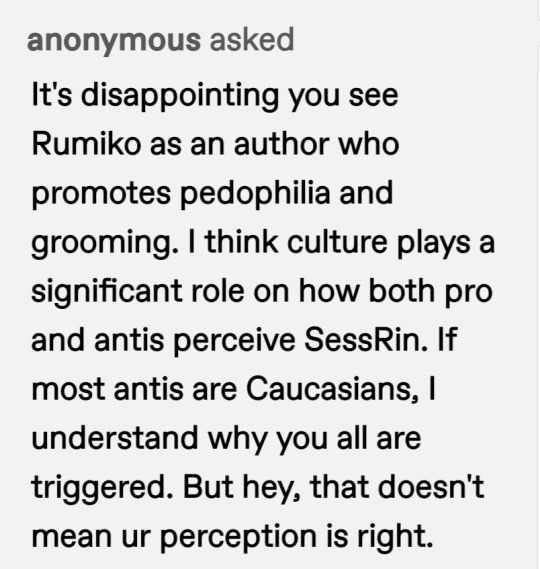
This answer is for your first two asks by the way. Firstly, you're putting words in my mouth because I do not view Rumiko as an author who promotes pedophilia and child grooming and never have. She never once placed an ounce of romance into their scenes. Rin was essentially introduced to serve as a catalyst for Sesshomaru's character growth. That's major in and of itself, which is why I'm not sure why she needs to be the mom on top of all that she's already done for him. It was you, Sessrin shippers, who had to go and make it romantic, not us. It was you who took every innocent scene and turned it into a romantic one. You'll even use some of their scenes as proof they will end up together, then back-pedal later and say those very same scenes weren't romantic in order to protect the sanctity of your ship. I mean, which is it? It can't be both, it's either one or the other.
I repeat, NO we don’t actually think Rumiko wanted to portray this relationship with pedophillic or grooming tendencies. It's you shippers who insist there is no other way for their relationship to evolve, as if you speak on behalf of Rumiko. Your interpretation of Rumiko's work is what implies child grooming; she may not be condoning it but your perspective sure is. You talk down to antis who disagree, because in your opinion, your interpretation is not only superior but already canon in your eyes. You're doing a disservice to this fandom by spreading false information like that when you try to pass it off as official. So if it's anyone that assumes they know what goes on inside Rumiko's head, it's YOU. Somewhere down the road in the (un)foreseeable future, it's you who changes course since remember we were all in agreement at the beginning that their relationship wasn't romantic. So what did I miss? Please break it down for me and explain what exactly influenced you to change your mind, then describe in detail how again this transition in their relationship magically came to be. It's you who came to that decision on your own- nobody helped you get there, and certainly not Rumiko (as you said yourself). The user boycottyashahime put it better than I did, so here is the link to their post. I highly recommend you read it if you haven't already. I urge you to keep an open mind about it while reading, too. You may not like what they have to say, but there's no denying they make excellent points all the same.
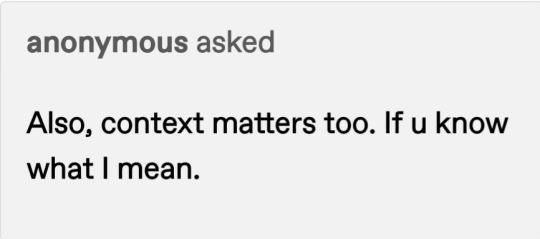
I'm pretty sure I catch your drift, but can you clarify if you're referring to historical context or cultural context? I suppose both can be applied here. haha Anyway, from what I gather, you believe that fans should be on board with the idea of Sessrin and at the very least tolerate the pairing. Whether they ship it or not, you believe this simply for the fact that the story takes place in the feudal era and couples with a similar relationship back then were more than acceptable. The thing is, we may be transported to Feudal Japan in this story but we're still taking our modern day morals with us for the trip. I have a whole ass blog dedicated to the significance of fiction in real life (convienently pinned on my page) if you wanna check it out. I also discuss what age-appropriate content is and isn't for Inuyasha viewers in this recent ask here that I find is also pretty relevant to the convo.
Alrighty, moving onto your next point. I can't stress enough to you guys that this isn't a mere Caucasian vs. Non-Caucasian dilemma. I'm a POC, so I ask that you please not presume to know things about me you couldn't possibly know unless we met or I shared it with you. In fact, many of the other antis I frequently chat with are POCs like myself. So for all that's good and holy, please stop ignoring us when we say: THERE ARE FANS IN JAPAN WHO HATE THIS SHIP TOO. THIS ISN'T A DIFFERENCE OF CULTURE, THIS IS A DIFFERENCE OF OPINION (& FACT). It may have not been called child grooming during that time, but that doesn't mean that it wasn't; it just went under a different name, that's literally it.
Let me give you another example. So if I'm watching a movie about WWII in Nazi Germany, am I supposed to sympathize with an SS officer if the story is being narrated from his point of view? Because in his mind and during that time period, his ideology is right. Like a lot of Germany during that war, I rally to support his leader for what is in my opinion a just cause. Tell me, how does context matter in this instance? Does it matter so much so that you would adopt the same ideals just because it was "historically accurate" and you don't see anything wrong with it when you put yourself in their shoes? Does the "it's just fiction" defense come into play here, too?
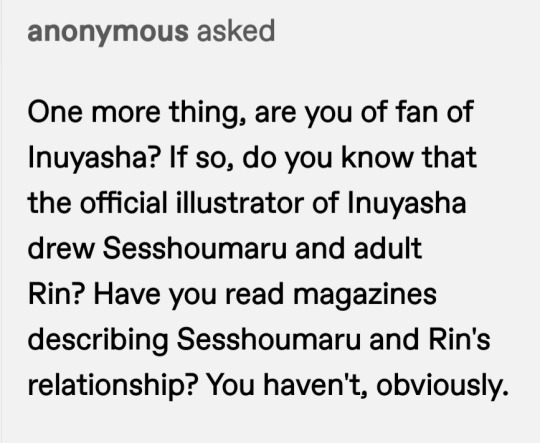
The illustration I believe you are referring to is the calendar with that one official illustrator for Inuyasha, right? The thing is, an official illustrator doesn’t equal the creator of Inuyasha. They may support the Sessrin ship, but their work has no connection to the Inuyasha series in any way besides the name affiliation. I've heard that the illustrator also included Kagome x Koga art, so should we take that seriously then too? Rumiko never once alluded to a future romance between Sesshomaru and Rin, to which you even (kinda) agreed. She described their relationship as neither parental or romantic, and she added that she even contemplated making Rin a boy at first. Fun facts, y'all!
I've heard about those magazines but they sound fishy to me. Would you mind sending me a link to a reliable source that comes with an English translation? I'd like to emphasize again that illustrators or VAs can do and say as they please, but their opinions are still only opinions at the end of the day. Nothing is set in stone until Rumiko says it is.
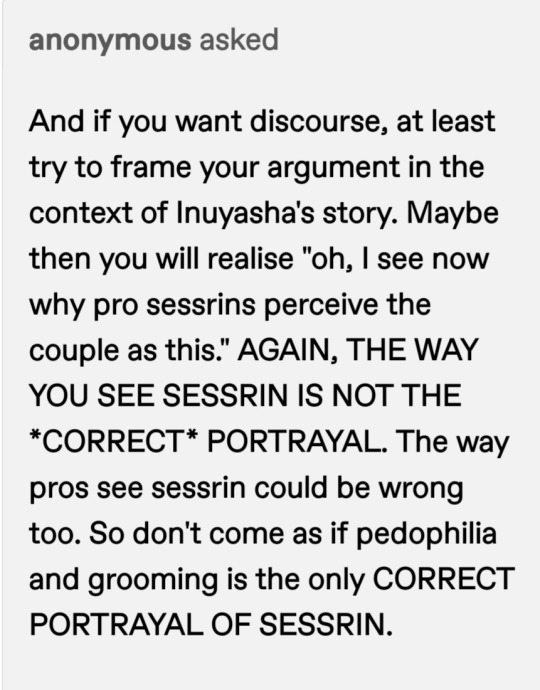
For one, I never said my interpretation was the only correct portrayal. That's you putting words in my mouth again. What I did say, however, was that my interpretation was more logical and reasonable than yours based on popular and widely-accepted story patterns found in real life and in fiction. Look this isn't about who's more "correct" or not. You can perceive Sesshomaru and Rin's relationship any damn way you want, BUT what you cannot do is dictate how we react to your depiction of this ship. You can't demand us to view your ship a certain way to fit your preferences. I'm sure all the hate on your ship can be unbearable at times, but that's just the cross you'll have to bear for supporting such a problematic couple. If a large part of any fandom is strongly against a pairing and what it represents, then there's usually a very legitimate reason for that. You may not want to hear this, but certainly you must realize there's some truth to it all. A couple of your fellow shippers have even admitted to me that Sessrin would be wrong IRL. You see what I mean? Even if we find the ship gross, antis don't care if you choose to ship Sessrin. All we care about is you acknowledging that, like IRL, Sessrin potentially poses a lot of problems for young viewers and how they come to make sense of and view similar situations that are borderline grooming or the very thing itself. Teens watching this show are more vulnerable and impressionable, which is why it's crucial to not show relationships like Sessrin in a favorable light. If they're ever put in a situation IRL that resembles Sessrin, they need to be aware and understand that it's not at all normal or healthy for that adult to make a move on them. Let's say Sessrin does go canon, then that would mean Rin had to get pregnant around 14 or 15. Sending that kind of message to an audience made up of mostly teenagers isn't exactly wise if you ask me. Please really think about that and sit with it if you need to.
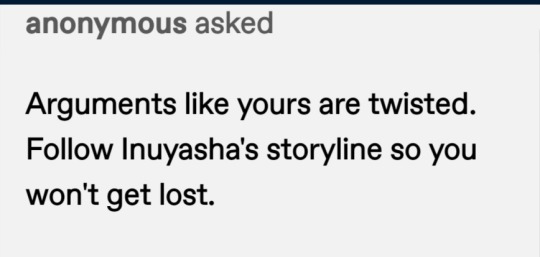
I'm positive I'm following the same story, thank you very much. Also, how can you be so confident making a statement like that when I have actual Sessrin shippers praising me for making valid points? Sorry to break it to you, but I don't think I'm as lost as you claim me to be or wish that I was.
That's a wrap, peeps!
Read over what I had to say again later and then get back to me if want, but only write me back if you plan to be respectful. Otherwise I will decline to answer. Just keep that in mind. And may I suggest only sending 1 or 2 asks at a time? Please and thank you!
I think I may know exactly who are, nonnie, but I can't say for sure. Besides, it doesn't really matter, as you have a right to stay anonymous if you so wish to. Listen, don't forget you are also more than welcome to interact (but appropriately) on my blogs/asks/etc. If you are who I think you are, then you recently did make a comment on one of them but didn't stick around when I replied back (and for good reason). Finally, if you hope to ever have a real discussion about this topic someday, first put your ego aside and refrain from throwing insults and then I'll hear you out. I have never once put you down in all of our interactions, so there's no need to show up here all riled up and aggravated in the first place. There's also no need to laugh at or mock other's opinions. Don't take jabs and assume I must not know something about Inuyasha just because I don't support your point of view. I may not agree with your opinion, but you don't see me having a condescending air about it.
Apologies if you're not the member I believe you to be, but no offense, you probably still needed to hear all of that too. It's not included here since I answered it immediately, but that final ask you sent me where you got angry and assumed I wasn't going to answer you was totally uncalled for. If you ever hope someday to participate in real discourse with me or any other antis, you should take my advice and seriously chill and learn how to be patient.
Hope this finds you well, nonnie!
40 notes
·
View notes
Text
P2D2
Cecilia Dickson
Halbert Barton
SOC 3-001
27 February 2020
How One Musical is Changing the Future
“For one thing, it is—by cold critical standards—the worst of the lot, with a repetitive score, painfully forced rhymes, cartoonish acting and a general approach that mistakes decibel level (literally and metaphorically) for emotional intensity” is what New York Times critic Ben Brantley wrote about the cult musical Be More Chill after it’s opening on Broadway on March 10th, 2019. Be More Chill is a musical by Joe Iconis with a book by Joe Tracz, based on the young adult sci-fi novel of the same name by Ned Vizzini. It follows high school loser Jeremy Heere on his quest to become popular by taking a pill called a with a microcomputer inside of it called a SQUIP, which implants itself into Jeremy’s brain and helps him to be more chill. Many shenanigans follow. Sound weird? It is, but that is the point.
The bad reviews did not stop at the Times. Mashable called it “a disappointment” and The Hollywood Reporter stated it “contains serious problems.” So, does it come as any surprise that the show closed five months after opening?
From the outside looking in, no. A bad Times review is a bad Times review, and a bad Times review will close a production. But a step into the Lyceum Theatre’s doors while Be More Chill played on it’s stage would suggest an entirely different story.
Excited teenagers dressed in full cosplay, standing ovations after the show’s hit “Michael in the Bathroom” belted out by George Salazar (who plays Jeremy’s best friend, Michael), a screaming stagedoor crowd that caused passersby to stop and see what celebrities where coming out (they often left disappointed), fans crying as they got to meet their favorite actors—The two pictures put together do not make much sense. What made this musical connect with this young crowd in ways that theatre critics missed, causing the show to close despite its enthusiastic audience?
Fourteen-year-old Luna discusses the wide expanse of diversity the show contains. “I especially saw this in George Salazar's performance,” she says, “with someone who's half Filipino, like me, playing such a major role in the show!” Similarly, another fan, Jenn, describes how “as a fellow Filipino who is also part of the LGBTQIA+ community, it honestly made me feel so seen for the first time” to see Salazar, a gay half-Filipino, half-Ecuadorian man, perform on a Broadway stage in a lead role. “It made me tear-up.”
The representation does not stop at race. Another fan, Skylar, says that “the fact that a character actually says ‘Oh my God, I am totally bi’ literally makes me want to sob” in reference to a bisexual character, Rich Goranski. Salazar’s character wears a rainbow pride patch on his hoodie and has the famous line, “My mothers would be thrilled!” that caused fans in the audience to scream and cheer nightly.
Beyond representation, many people love the show because of it’s message. Twenty-five year old Erika states “It gives a voice to all the weirdos and people with anxiety/depression but in a way that's also comedic and colorful and fun and people really need that!” Similarly, twenty-eight year old Kayleigh describes her experience connecting to the show. “Then, when we got to [the song] “Upgrade” and [the lyric] ‘I'm tired of being the person that everyone thinks that I am’ was sung, and I immediately began to cry in my seat because, for the entirety of my life, I've worn a facade, quieting my interests and my desires in order to make other people happy . . . I felt seen as a person.”
If representation, from race to sexuality to mental illness, is what drew people to Be More Chill, the community is where people stayed, finding their home in it’s fandom. Through being mutual fans of the show, Luna met her girlfriend, Taylor, who happily explains “also because of [Be More Chill] I have a girlfriend! She is the greatest thing that has ever happened to me.” Kayleigh and Erika have found friendship in a Twitter group chat called the “Vintage Cassettes,” a play on a lyric in the show, while Luna and Taylor have true, close friends in their Twitter group chats, all formed because of their members’ mutual love for Be More Chill.
The community of Be More Chill fans—often called ‘stans’—is unlike your average fandom scene. Kayleigh describes how “being a stan of Be More Chill means being accepting of people's identities and being there for each other,” and Luna says, “in my experience, Be More Chill stans have been a lot more welcoming than stans I've interacted with in other fandoms.” Be More Chill stans are “loud and passionate” and unashamedly so.
Returning to the question at hand of what made this show connect to its audience, it was how the show was so open and welcoming, with it’s diverse cast of whacky, fun, weird characters, it allowed people to see themselves onstage. It shows people that there is a place where they belong. Luna remarks: “As someone who has stanned theatre for more than three years, it took my discovery of George and Be More Chill just over a year ago to get me to understand that I, a mixed race LGBT+ person, do have a place in this world and in this community.” Be More Chill gave so many people one thing that every person needs, a place to belong, and people to share that place with.
And while the show is not every person’s cup of tea, especially theatre critics, the stans know that. “The show isn't perfect and doesn't try to be,” Taylor says. “Be More Chill is one of the most loved and hated Broadway musicals, which makes the fandom very different. We are all very close and very protective of the show as a whole.” But, speaking on the show’s importance, Taylor states that “Be More Chill gives people a voice that they didn't know they had.” Jenn describes how “that kind of impact is something not to be undermined.”
And it is true. Influences such as Be More Chill are important in society. The fandom behind Be More Chill has given people a family, a found family. It has inspired young people of color, young LGBT+ people, like Luna and Jenn, showing them that they have a place in this world. The show’s message and how it handles topics such as mental illness has connected to millions across the globe. The societal influence of Be More Chill is far greater than any Times review or single opinion. It’s influence has inspired young people, connecting them to friends on the other side of the world, providing them with support they often do not find at home. It is showing young people that they do belong in this world, and in doing so, it is shaping the young people— the future—of this world.
-------
Glossary Terms:
Cosplay: The practice/art of dressing up as a fictional character
Stagedoor: Where actors enter and exit the theatre - often, this is where fans traditionally meet the actors. Stagedooring is the act of waiting at the stagedoor after a show to meet the actors and have their programs sign, a loved tradition by many theatregoers
LGBTQIA+: An acronym referring to the lesbian, gay, bisexual, transgender, queer, intersex, asexual, etc., community
Stan: A shortened version of the term stalker-fan, which started out with negative connotations, but in recent years has come to be a positive term meaning super-fan. It can also be used as a verb to describe the act of becoming a stan. For example: “After hearing her new album, I totally stan Taylor Swift.”
Fandom: an umbrella/unifying group term for people who are avid fans of a piece of work
Found family: A group of people not related by blood who consider themselves to be a family in every other sense of the word
-------
Works Cited
Brantley, Ben. “Review: Anxious Teenagers Learn to 'Be More Chill' on a Big Stage.” The New York Times, The New York Times, 11 Mar. 2019, www.nytimes.com/2019/03/10/theater/review-be-more-chill-joe-iconis.html.
Scheck, Frank. “'Be More Chill': Theater Review.” The Hollywood Reporter, 11 Mar. 2019, www.hollywoodreporter.com/review/be-more-chill-theater-review-1193609.
Strecker, Erin. “'Be More Chill' Will Probably Be a Broadway Hit. Too Bad It's Also a Disappointment.” Mashable, Mashable, 10 Mar. 2019, mashable.com/article/be-more-chill-review-broadway/.
2 notes
·
View notes
Note
you asked for it kiddo... do you have any la squadra backstory hc's? (i saw it in one of your tags don't try and hide it 👀)
oHHHHH!!!!!! THANK YOU- this got pretty long jhhhhhggh,,,, and also!! some of these are very heavily influenced by stuff i’ve seen in the fandom, although a majority of these are my own!
(Content warning though, this gets pretty heavy- i’m going to be talking about death, miscarriages, illnesses, injury, neglect and csa in this one. Tagged and under a cut to be safe.)
RISOTTO NERO
No one would believe you if you told them, but Polpo is his father. If the eyes didn’t give it away, Polpo’s old pictures (if you manage to get a hold of them, that is) most definitely will. No one knows how Polpo ended up looking like that now, but in his younger days, around the same age as Risotto, he looked pretty much exactly like him.
He’s not aware of his biological mother, but he knows she’s a stand user from Egypt, who utilizes magnetism.
Risotto was adopted by a Sicilian family, and was raised without knowledge of his connections to the mafia, or stands. It was not until he began killing at age 18 that he began to look more into who his real parents were.
He doesn’t resent his adoptive parents- his adoptive father was a carpenter, who raised Risotto to be well-versed in carpentry as well, and his adoptive mother was a seamstress. He had an adoptive older sister, and of course, his little cousin who came over so often he practically lived with them. His family isn’t perfect, of course- his father is too strict, his mother too troubled, and his sister was too distant. Thinking about it now as an adult, he couldn’t blame them for being like that. His mother’s miscarriage probably weighed on the family too.
He was always the quiet brooding type. As a child, his quiet inclinations were regarded as him being shy. When he reached into adolescence and began forming opinions of his own, Risotto was then given the “quiet and serious” adage under his name. He’d always been the type to lead and act according to what he believes is right, after all. That being said, however, he operates under his own judgement and experiences, and the same can still be said about him even after so long. His general distrust of authority began showing itself in his adolescence, as well.
Sometimes, Risotto feels a tug in his heart, begging him to come home in their little house in Sicily, and visit his family once more. He painstakingly ignores this, and carries on. He does keep tabs on them however, and the knowledge that they’re safe and sound is enough to carry him on.
He joined Passione at 21 years old, around the same time he awoke his stand. He used to be of equal footing to Sorbet and Gelato, who at the time were both under a different capo. He broke apart from the gang to form his own, having decided that assassination was the best application for his skills after being involved in one of two many murders that were considered “overkill”, even for the mafia.
FORMAGGIO
Formaggio came from an average to low income family. His family was big, too- he had a mother, a father, two older sisters, and three younger sisters. As the only son, he was depended on for a lot of things, and often had to fill in for the father that his little sisters are clearly missing, by being the best older brother he could be. Obviously not by his own volition- he’d very much just relax and enjoy his teenage years, thank you very much- but he’s smart enough to know that his sisters deserve someone to guide them in their early years.
He’s always been street-smart, having dropped out of school just after he finished 7th grade to work. Home life was rather bleak- his father wasn’t home often, but when he was, he was always drunk and would go and beat his mother and his older sisters. This eventually stopped when their father died of liver cancer. Formaggio’s never been religious, but he felt overwhelmed enough to thank whoever was responsible for it.
He committed his first murder when he walked in on one of his elder sisters getting beaten by her husband. Formaggio at the time lived with her, and with two of his little sisters in tow. His other elder sister lived with his mom, along with his other little sister. Thankfully enough, the children were not there to witness either of the abuse or the murder. This had Formaggio contemplating a lot of other things, and soon, he succumbed to the bleak, and harsh criminal underbelly of Italy. He was recruited a year later by Risotto.
Just to establish my last point- Formaggio is actually only one year younger than Risotto- which makes him older than everybody else save for Sorbet. No one else but Risotto, Sorbet and Gelato believe this.
ILLUSO
Came from a well-off, but not wealthy, family. He had an older brother and an older sister, and while their parents weren’t always present due to work, they made sure they were there when public appearances were necessary. He’d always been distant with everybody except for his elder sister, who would care for him to the best of her ability despite being frail and sickly.
Illuso always had a fascination with observing behind the scenes. Being quiet and often overlooked, he grew accustomed to being alone. That doesn’t mean he didn’t sneak off to spy on other people’s conversations he probably shouldn’t be listening to in the first place.
He knew something was bound to come out of those late night meetings where his father would come home tipsy and infuriated about something. Soon enough, his suspicions were confirmed. His father had lost everything to his gambling addiction, and with it came the family’s already estranged relations with one another. The final straw was when his sister died.
Illuso, having lost all motivation to keep living in such a life, left home. He figured, he’d always been alone, anyway. What’s a couple of years in the streets gonna do to him? With his natural intuition and general sneaky tendencies, his skills proved important out in the world, where the rule was survival of the fittest.
He was found by a capo, and drafted into the Intel Team after he’d been shot by the arrow by accident. He was a key member until he was reassigned to La Squadra due to a sudden influx of newcomers in the mob.
Admittedly enough, his origins have made him somewhat sympathetic to Fugo, although he’d never admit it.
PROSCIUTTO
Prosciutto was born from an American-Italian family, and was totally a private school kid. He was raised in the States for a while until his 15th birthday, where he travelled with his grandfather from the US to Italy. His family was distant and secretive, but he definitely knew they had ties to something very, very illegal. His mother was sickly and stayed at home, seeing doctors more than she saw her own sons; and their father was never around. Despite the luxury they were raised in, he and Pesci were all they really had.
He might’ve not noticed it when he was young, but he was trained and educated exactly where they wanted him to– to eventually take over the family business when he was old enough. His grandfather was incredibly supportive of this, and when Prosciutto started showing signs that he had tremendous potential to become the head of the famiglia.
When he travelled from the US to Italy, this was his first introduction to the bleak life his grandfather led. He committed his first murder at 16, all curated and taken care of by the mafia. It was certainly a bit much, but Prosciutto showed commitment to his grandfather’s will for him.
He joined Passione at 20 years old, after his famiglia’s territory was taken over by Passione. Some of his men survived, while some were not so lucky. He was officially drafted into the Hitman Team shortly after Formaggio was.
PESCI
Him and Prosciutto are actually full brothers. Him and Prosciutto were private school kids, and while Prosciutto aced all his classes, Pesci was content receiving average marks. He truly excelled in choir and in theater, however, and in turn made his mother incredibly proud of him. She would always come to his recitals whenever he performed, main role or not, despite how sickly she was.
Pesci didn’t bother with their dad- Fra says not to. And while was not close to his own grandfather like Prosciutto was, he was incredibly close to his uncle. While he had his suspicions about the true source of their family’s ludicrous wealth, his uncle always made sure to spend time with Pesci, taking him out swimming and fishing and all that. His uncle made sure he had a childhood- too concerned with Pesci being drafted into their dangerous lifestyle too early like Prosciutto was.
When Prosciutto left for Italy, Pesci stayed behind for a while, as he was only 12 when his brother went. He caught wind of his brother’s untimely fate of joining the mafia when he was 17, and it goes without saying that Pesci was heartbroken. He then ultimately made it his goal to find him and be reunited once more.
Pesci was drafted into Passione at age 20, but became a part of the Hitman Team at 21, after a particularly intense argument with Prosciutto.
MELONE
Melone was born in Switzerland, but he moved to Italy when he was around 10 years old. His parents were doctors who were constantly away due to their job, and while he had no other siblings, his parents made sure he had everything he could ever want. From toys to new clothes to books, he was very much spoiled. Perhaps it was to compensate for the fact that while he attained a lot of academic achievements, his parents remained absent. They were very proud of him, however, as he’d proven himself to be nothing short of a genius at a very young age. He was polite, and spoke well with elders. He generally got along with his peers, although they did find him odd and intimidating at times.
When he was in his teens, he begun to seek out partners. Perhaps due to his own curiosity, he saw too much a little too soon. This was also when he’d killed his uncle in a fit of rage, after he’d tried to assault Melone. This was when his genius turned into a maddening hunger for knowledge. It goes without saying that Melone experimented on his uncle’s corpse, and a bunch of other laboratory samples.
When he dropped out of university, he begun to sell information about his research in shady places online. He was drafted into Passione when a capo took note of his rather… interesting discoveries about reproduction and genetics, and figured his abilities could prove useful.
He became part of the Hitman Team shortly after Illuso joined.
GHIACCIO
Ghiaccio was born in Korea, but moved in his pre-teen years after his parents were offered work in Italy. He had an older sister whom he idolized, and initially was his reason for pursuing ice skating in the first place. Their parents were never the most outwardly affectionate, towards each other and their children, but Ghiaccio’s older sister always made sure he knew how much she loved him.
His interest in linguistics were sparked by his parents, who were interpreters. He never really cared much for it when he was really young, but when he began to turn his attention to books instead of his peers who would often cast him out, he found out he was a natural at picking up different languages and its quirks.
He started seriously skating when he was 10 years old, and would always beg his sister to come with him. She humoured him, being a skater herself. Ghiaccio has very fond memories of those winter mornings when him and his sister would sneak out of the house to go find a lake frozen over, and skate for a few hours, forgetting all their troubles. He started competing at age 13, and won his first gold medal at 14. He proved to be a prodigy in ice skating.
Due to his peers casting him out and emotional neglect from his parents, his characteristic anger issues began manifesting. They started showing more violently out of humiliation and hatred for himself when he injured himself during a performance. He begun to shut others out, only ever reacting in anger and annoyance. His anger issues got worse when his older sister was injured just before one of her performances, and out of anger, he took off and killed the person who had orchestrated her injury.
Knowing he could never return to his old life after this, he set off and took his anger out on a random group of strangers at a bar who pissed him off too much at the moment, the alcohol in his system amplifying the anger and shame he felt. He was found by Sorbet and Gelato, who recommended him to Risotto. He became part of the Hitman Team shortly before Pesci joined.
#rowanthejojonerd#answered#jjba#vento aureo#la squadra di esecuzione#risotto nero#formaggio#illuso#prosciutto#pesci#melone#ghiaccio#hoghhhhh this got long#miscarriage//#death//#csa//#abuse//#neglect//#illness//#injury//
216 notes
·
View notes
Text
LGBTQ+ Characters in Comics from the 20th century I like
It’s June, Pride is here and rainbow colours are everywhere. So, I figured I’d be a little retrospective and share a short list of LGBTQ+ characters in comics from the 20th century I have a soft spot for. I’ve organized these by date of the characters first appearing but, happily most are still having stories written about them today.
Let’s start with three ladies from DC:

Catwoman
Catwoman, specifically Selina Kyle has been around comics for a long time, nearly as long as the turbulence of her relationship with Batman. Though, Bruce isn’t they only character she has involved herself with over the years. I’ve got my share of comics featuring this fierce lady of many lives and antiheroine, including part of the New 52 run by Genevieve Valentine a few years back where her bisexuality was acknowledged as canon. Though, it was the film adaptation Batman Returns in 1992 with Michelle Pfieffer that blew me away when I was young. And remains, I think the most iconic Catwoman costume, which you can see in 4K now. Hear her roar.
Wonder Woman
Wonder Woman is another longstanding character and probably the most popular female superhero. I had comics as a child with Diana along with watching the sometimes campy 1970s TV series with Lynda Carter. Perhaps even more interesting than the Amazonian warrior herself is the passions of one of her creators William Marston and the themes of those earliest comics. (I’d suggest the book Wonder Woman: Bondage and Feminism in the Marston/Peters Comics 1941-1948.) And of course, also the controversy over a strong heroine standing on her own sparked by Fredic Wertham in Seduction of the Innocent.
Poison Ivy
Poison Ivy, or Pamela Isely with her sexual agency and connection to the Green, who admittedly may go about fighting for the environment as well as for women or children in the wrong way sometimes, is my top female character from American comics period. After again some rough treatment in comics recently, I wrote this year about her origins since 1966. Most people these days probably can’t think of Ivy without Harley, since it’s been 20 years since their first meeting in comics (longer for other mediums) but, these gals have a relationship that isn’t monogamous and has had it’s on again off again points too. (And note to DC maybe get it together on just how you define it since you waffle a bit hmm?)
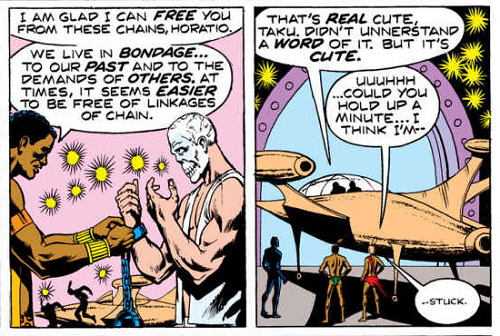
Taku and Venomm
Black Panther was one of the few Marvel comics characters whose stories I’ve wound up reading. (My mum had this thing against some comics and one of my older brothers mainly passed on DC issues to me.) The Jungle Action installments written by Don McGregor are to this day still memorable. And part of that should be due also to Taku and Venomm (Horatio Walters), the latter first appearing in the “Panther’s Rage” arc. Though, it would take time for the open acknowledgement of this example of early gay characters in comics. Sexuality outside the heterosexual among other topics was taboo in the 1970s yet, McGregor managed with a collection of artists to bring a vision of Wakanda focusing largely on its black inhabitants and difficult social issues in the world to publication.
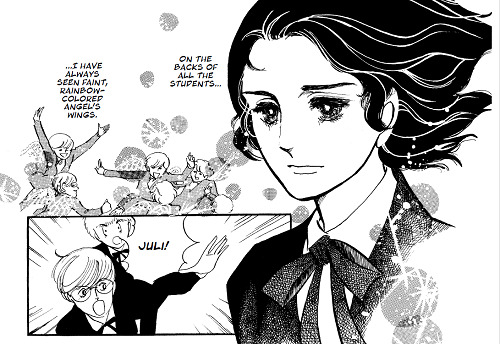
Juli Bauernfeind
I read The Heart of Thomas by Moto Hagio about boys at a German boarding school when I was 21. Juli was a character I connected to and the story had a profound effect on me. And I bawled my eyes out. It still makes me cry and is still one of the best comics I’ve ever come across. I reviewed the English edition a few years back. As well as wrote a post on the French bisexual author Roger Peyrefitte whose novel was adapted into a film which inspired Hagio.
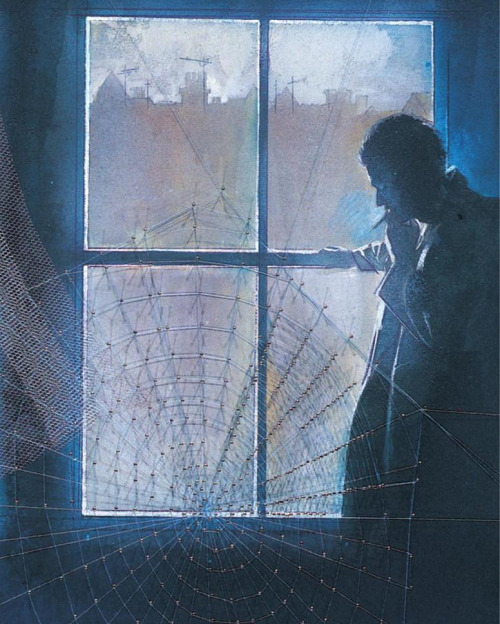
John Constantine
Full of politics, call it dark with a dose of nihilism but, Hellblazer with John Constantine is just damn good. Sometimes the world is awful, people are awful, you’re awful and well yeah everything is going to hell. Constantine is pretty much dreadful for the women he’s often involved with, or well anybody really. It was in the early 90s readers were first clued into the history of his love life made up of girlfriends and boyfriends. And can we fail to recall the later S. W. Manor from Ashes & Dust: In the City of Angels, one of the most visceral takes thru a character that is basically a stand in for Bruce Wayne, and his twisted relationship with John? I’m not. It’s been a strange trip over the years some adaptations really glossing over his sexuality. Though of late handling this aspect of his character appears to have gotten better.

Stormer and Kimber
The madcap Jem and the Holograms was one of my favourite cartoons as a child in the 80s. I even had some of the dolls and cassette tapes. Stormer aka Mary Phillips part of the Misfits was the rock star I loved the most. Dedicated to music and actually quite sweet with the optimum blue hair. I had to try the colour myself. The episode where she teams up with Kimber after both have differences with their respective bandmates is a classic. So, it was truly outrageous when the series was revived in 2015 in comic book form by Kelly Thompson and Sophie Campbell, and the Stormer and Kimber relationship that had been brewing came fully out for fans. (Btw the comic also added a new character, Blaze who is a trans woman and girlfriend of Misfit’s fan Clash.)

Ash Lynx and Eiji Okamura
It’s been interesting to experience Banana Fish by Akimi Yoshida in different ways from first encountering the comic when I was a teenager, picking it up again in my twenties, and yet again the animated TV series last year. I wrote about the comic and first few episodes of the 2018 adaptation when it was airing. Though, I haven’t posted much more on it because there’s a tiny percentage of its fandom I want to avoid, as well as 30+ years on the series is still— pain. This one is a tragedy folks. However, it also has a beautiful healing love story and touched on a variety of hot button issues that are sadly still relevant today. My love for these two teen characters in a gritty USA will live forever.
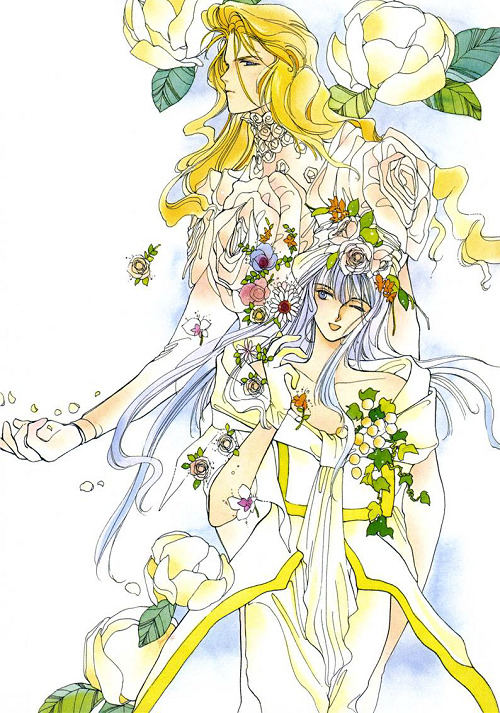
Chihaya and Kagetsuya
I’ve written before how the sci-fi title Earthian was what introduced and endeared respect for m/m comics from Japan for me. The art style of Yun Kouga has changed a bit over the years, nevertheless still stands out from the crowd. And Earthian with a taboo love between androgynous male angels remains my favourite of her work.
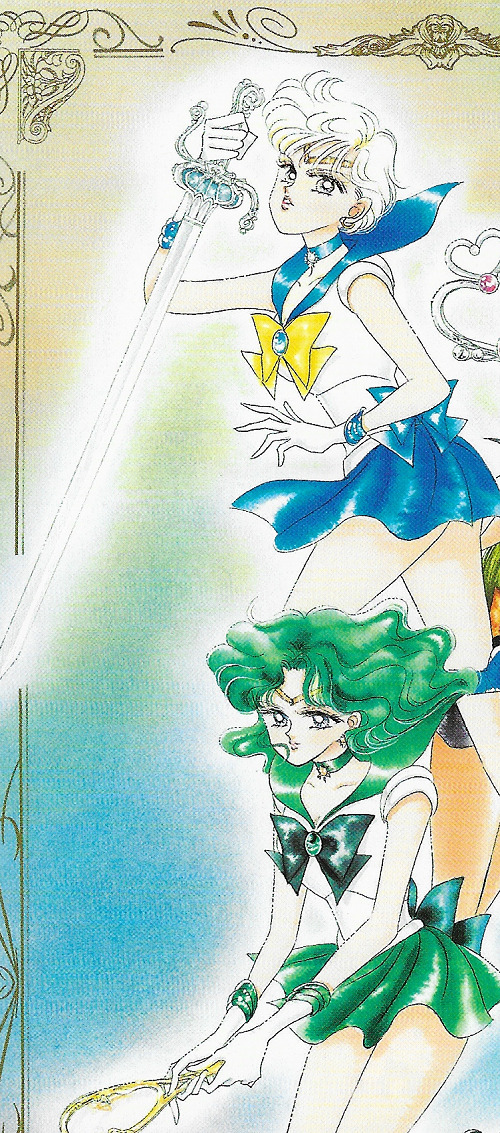
Michiru Kaiô and Haruka Tennô
Sailor Moon has become a multimedia sensation and is beloved around the world. Many kids and even adults of all sorts in the 90s will remember it in one form or another and cite it as an influence for pursuing careers in all sorts of creative fields. Along with countless fans recognizing or discovering something of themselves in the characters. There are several different characters for rep in the series. But particularly for me Michiru and Haruka were an opportunity in a very anti-LGBTQ+ climate (their relationship was even refashioned as being cousins when brought out in English for the first time) to nevertheless see such a loving, positive relationship.
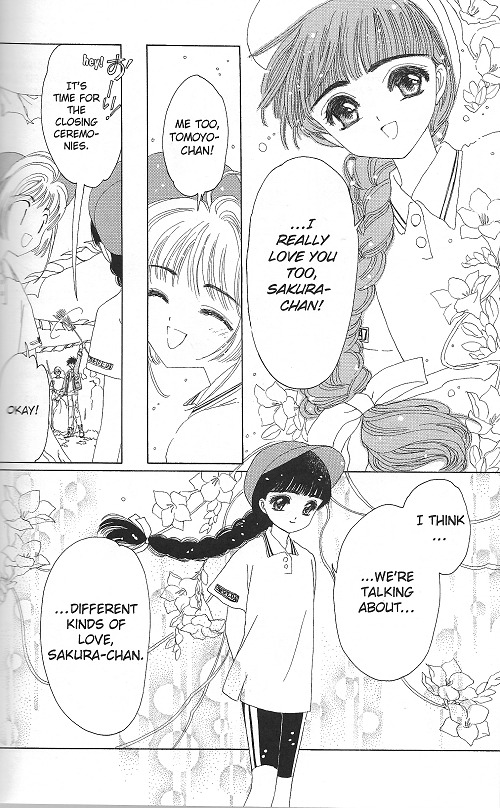
Tomoyo Daidôji
Love is a theme the creative team CLAMP revisits and revisits and Cardcaptor Sakura is the magical girl comic series with a theme on all different forms. It is one of the first all ages titles from Japan that I will recommend to people. (Despite fyi containing a whopping four student-teacher relationships. Not the purpose of this post to go into right now though.) The best friend to Sakura, Tomoyo is one of my favourite characters. Always supportive, maybe a bit alarming popping out of bushes or other spots with her camera at the ready to catch either Sakura’s everyday life or battles, and possessing boundless fashion sense. (Btw, there are other characters in the series that are or could be interpreted as examples for my list as well. Sakura among them.)
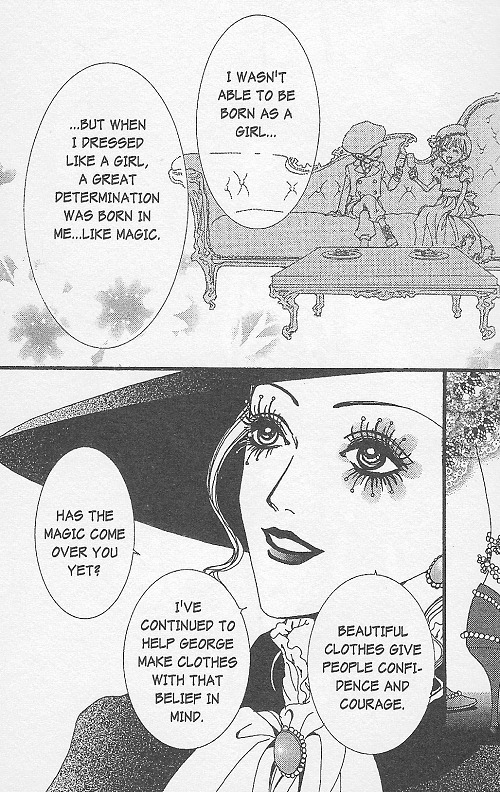
Isabella Yamamoto
Paradise Kiss by Ai Yazawa, a sequel of sorts to one of the huge girls’ comics titles of the 1990s Gokinjo Monogatari, introduced a group of teenagers on the verge of graduating, some with an idea of what to do with their lives and others questioning the path they’ve so far taken. Isabella from an affluent background but, who struggled for acceptance from her family or nearly anyone until she was gifted a handmade dress by her childhood friend George (who is Bi btw), studies pattern drafting at the same art school as Gokinjo Monogatari. The most mature of the main cast, refined, always listening and offering a cup of tea, she achieves her dream career and self-actualization in fashion. Since I have a degree in fashion design, I have to agree that clothes are so much more than just something we wear.
#lgbtq characters#comics#catwoman#wonder woman#poison ivy#taku#venomm#juli bauernfeind#john constantine#stormer#kimber benton#ash lynx#eiji okumura#chihaya#kagetsuya#michiru kaiô#haruka tennô#tomoyo daidôji#isabella yamamoto
37 notes
·
View notes
Text
Looking Back at iCarly
In...5...4...3...2...
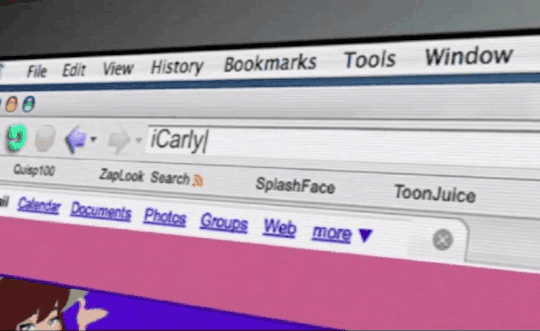
Hello internet! This blog lives on, and so do I! My Nickelodeon heart still beats, and here I am in 2019, having recently finished re-watching iCarly…again. Admittedly, there is a part me still clinging to this fandom and I don’t think it will ever go away. So, I recently sat my grown ass adult-self down to re-watch the series, and I feel the desire to just talk about it.
Let’s preface everything with an acknowledgement to nostalgia and the impact it has on how we view things we enjoyed in the past. Nostalgia is typically viewed through rose colored lenses that disguise the truth about whatever it is we remember so fondly. I realize this, and fully acknowledge that nostalgia is probably the biggest reason for my enjoyment during this re-watch; but whether it was nostalgia or not, I have no shame in saying that I loved it. I loved every single second of it. Yeah it was a little cringey at first, (Honestly, that’s to be expected when looking back at shows like these with more mature eyes) but that feeling settled pretty fast, and it didn’t take long for me to fall right back in love with the show.
I love this show. I watched it frequently as a preteen into my teenage years (Around the ages of 11-15 I’d say). I watched until about Season 3 but I ended up falling off with it as I grew older; so I never saw anything from Season 4 onward during its initial run. Fast forward a few years later, and somewhere around 2013 an iCarly clip found its way into my YouTube suggestions. I don’t remember the specific clip, but it had something to do with Sam and Freddie (It may have been the elevator scene from iLove You). It caught my attention because I always remembered thinking that Sam and Freddie would end up together. Curiously enough, I clicked it, and that served as the impetus to make me watch the entire series. I watched it all, and I loved it. I loved it so much that I even made this blog dedicated to it, and other shows cut from the same cloth. I had my heart stolen by Sam and Freddie, and obsessed over the pairing like many others had done before me. I became so attached to the characters, and as corny as it sounds, I felt like they were my friends. I just loved it all. I was hooked, and the series known as iCarly ended up leaving a lasting impression on me. Going on that journey was such a blast; but like all good things, it eventually came to end. After a while I started using this blog less and less. I slowly stopped watching reruns of old Nickelodeon shows, and I eventually fell off completely. So now, we fast forward one more time and here we are in 2019, I have watched the series again, and it turns out that I still harbor that deep connection to it that I had before. The fandom still lives within me, and I’ve realized it will never go away. It is always going hold a place in heart.
Now that my long-winded introduction is over, let’s move on to talking about the show itself. Upon this most recent viewing of the series, I will say that in my humble opinion, the show peaks in Season 3. While I may love the series as a whole, I cannot deny that its glory days are definitely in its earlier years. During this re-watch, I noticed a subtle dip in the quality of show from Season 4 onward. It’s not like it falls off a cliff or anything, it was still very enjoyable, but it definitely felt like they were losing control. This trend continued in Season 5, and parlayed right into the final season as well. By the time you reach the end, it’s apparent they were desperate for ideas, or were just ready to move on. Again, it’s not awful, but it’s not firing on all cylinders like it was in the earlier seasons. There are a plethora of issues we could point to when discussing this, but I think the biggest culprit to the show’s decline in quality was the “ships.” That entire craze definitely had a negative impact on the series overall; even as a “Seddier,” I can admit that. I’ve actually previously, briefly discussed (Here) how I believe “shipping,” directly changed the original, intended story of Sam and Freddie; and I still believe that. The creative direction was undoubtedly influenced by the divide in the audience, and I don’t think that can be disputed. But regardless of the slight dip in quality, I will say that iCarly is still tremendous overall, and Seasons 4 through 6 still have their moments and some great episodes. Season 6 itself recovers wonderfully by the end, with the last five episodes of the series serving as a splendid return to form for the show.
iCarly was one of the most successful Nickelodeon shows for a reason…because it truly is great. In many ways it was a glimpse into the future when you think about the power of the internet and its ability to influence and create success nowadays. It capitalized on that ever growing popularity of the internet, and did so wonderfully. Who didn’t want to have their own version of the iCarly web show? Everyone did, it was the coolest concept. Couple that with the amazing cast they gathered to play the character’s we all came to love, and the show had a recipe for brilliance.
Let’s actually talk about casting on this show because it is absolutely tremendous…
Miranda wonderfully transitioned from the devious little sister, Megan, on Drake & Josh, to the lovable protagonist known as Carly, and she was perfect for the role. Carly is portrayed as the best friend that anyone could ever ask for, and Miranda fills that role so believably well. You truly feel that she cares deeply for all of her friends, and honestly, I think that’s just an extension of Miranda herself. All you have to do is listen to any of her fellow cast member’s talk about her, and it’s not hard to understand why she played Carly so well.
Then there is Jennette; what else can I say about Jennette McCurdy that I haven’t already gushed about on this blog? I adore her to pieces, and her on screen counterpart known as Sam Puckett, I adore even more. I’ve heard Jennette be critical of the show and the role she played, especially as she’s gotten older and distanced herself from the Nickelodeon bubble, but I honestly think she doesn’t give herself enough credit for pulling off Sam the way she did. There is nobody else they could have cast to play that role better than her. There are many layers to Sam Puckett, and while the show tends to shy away from truly fleshing that out, we still get glimpses of it throughout the series. It’s the biggest reason why I love Sam so much, and Jennette excellently captures that contrast within the character. Sam is a tough as they come, and rarely displays compassion or vulnerability, but underneath her rough exterior is a wonderful person with a heart of gold. Much like that character, it often seems that there is a lot more than what’s displayed on the surface with Jennette as well, curiously enough. She herself, is somewhat of an enigma (which I plan on discussing one day as well). The character, and actor are very similar in that regard, and I think that’s why Sam was so great. For the purpose of comedy, Sam is a totally over-exaggerated character, and much more of a tomboy than Jennette is in real life, but beneath all the comedic hyperbole, there are some striking parallels between the character and the actor.
Of course, there is Nathan Kress, who played the role of Freddie, and did a splendid job capturing the loveable tech nerd Freddie was; especially in the earlier years. Nathan also deserves major props for continuing to pull the Freddie character off as time went on because let’s be honest, Nathan matured into quite the handsome young fella right in the midst of this show airing. It was funny juxtaposition to see him still have to portray Freddie, as Sam might say, a “nub,” when he very clearly wasn’t. So again, props to him because he still made it believable that Freddie was just a big dork who struggled with girls and whatnot despite his dapper, physical appearance.
Who doesn’t love Jerry Trainor? He comes across as the most fun person to be around, and I have to imagine that working with him is a total joy. All you have to do is watch the blooper episodes, iBloop and iBloop 2, and you can see just how much fun he makes the work environment for all of his fellow actors. He, as Spencer, is low key probably everyone’s favorite character. He was the perfect choice to portray Spencer, and while he does all the whacky humor and eccentric behavior perfectly, he also captures the moments where Spencer needs to be a responsible adult, arguably even better.
And last but not least, Noah Munck as Gibby. From starting as a reoccurring character with a strange quirk where he persistently took his shirt off , to transitioning into the main cast where announcing his own name in exaggerated fashion became a staple of the show, Noah took this peculiar character and brought him to life in the most entertaining way possible. To quote Gibby himself, Noah made the show, “a lot of fun,” and provided some of the best laughs in series.
I cannot say enough good things about iCarly. It is an all-timer as far as Nickelodeon shows are concerned, and those who were part of the fandom know just how special it was. I’ll forever hold it in my heart, and remember the joy it brought me whenever I “need a laugh, cheer, or random dance.”

And, we're clear...
#icarly#carly shay#sam puckett#samantha puckett#freddie benson#spencer shay#gibby#miranda cosgrove#jennette mccurdy#nathan kress#jerry trainor#noah munck#mine
4 notes
·
View notes
Text
Top Worst Books I’ve read in 2018
It’s that wonderful time of the year again, where I scream and rant at books that disappointed or pissed me off all the while trying to avoid hate comments.
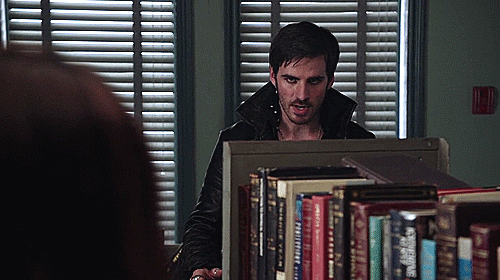
This is my personal list of books that I did not enjoy. If one of your favorite books is in here, don’t take it as an insult towards you. I’m not saying these books are bad, I just did not like them.
Alright? So, let’s start.
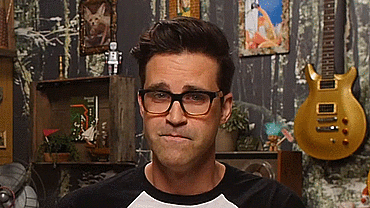
The Shatter Me Trilogy by Tahereh Mafi

There was a lot I didn’t like in these series. First of all, the writing style. I understand what the author was trying to with the crossed words that represented Juliette’s true thoughts, but it really got on my nerves.
Then there was the plot. This is supposed to be a dystopian future, but that’s really a backdrop for the romance and, a love triangle. While I agree that Adam was not suitable for Juliette, I really couldn’t get into Warner. In the first book, he was straight up a sadistic psychopath, then the rest of the books he does a complete 180º, it felt like a completely different character was created so that he could be a good love interest for Juliette.
And if the romance is the most important thing in the plot, it’s a bad sign I was mostly interested in the secret connection between the Adam and Warner and how much I wanted to see that developed. At the end of the third book, I sort of wanted to follow another character but Juliette.
And what the hell was that ending? It was one of the most anti-climatic endings I have ever seen.
I know the series will continue with another 3 books, but I doubt I will continue it. I’m not interested enough.
The Fandom by Anna Day
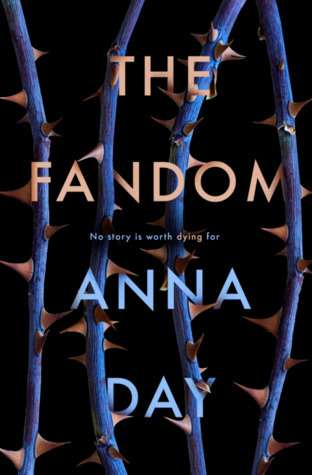
Okay, what the hell were the people in charge of the Portuguese cover thinking?
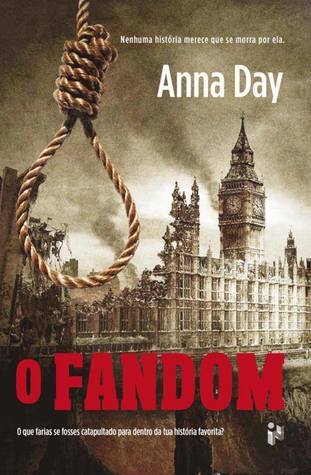
It’s so ugly! At first, I thought I was looking at a Jo Nesbo book. Oh well... I could forgive the cover if the story made up for it, but it did not.
This book had so much potential. A group of cosplayers is transported into their favorite dystopian series and realize how reading about it is a lot better than living through it.
The main character Violet was so annoying and I couldn’t connect with any of the characters. Everyone except for Katie, Nate and Ash were scum or really annoying. I couldn’t connect with any of them. And the way they went after Alice for her looks and her fanfictions (she dared to write stories in the bad guys POV!!!) it really pissed me off. I understand in the context of the story but my God! I write fanfiction. If someone said stuff like that to me I would kick them in the gonads.
And that ending. What the hell?!
Caraval by Stephanie Garber
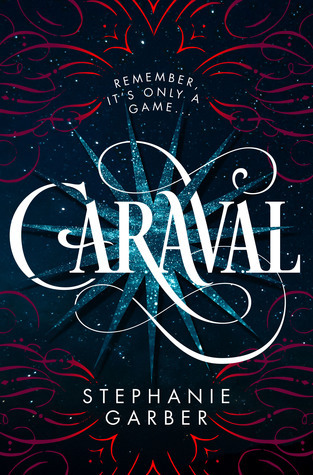
I like plot twists. One plot twist is fine. Two is awesome. Three... it might be too much. Four, five... just what the hell am I reading?
There were so many twists and lies in this book I honestly can’t give you a synopsis because I can’t remember what happened and who was supposed to be who.
This book felt like being drunk and high during a festival. A lot of pretty colors, but nothing substantial.
The Savior’s Champion by Jenna Moreci

Oh, Jenna... why?
I've watched Jenna's videos for a while and I was pretty excited to finally read one of her books. First the positives, the writing style was very good and the plot very intriguing. I could not wait to read the next chapter and find out who lived and who died. Unfortunately, I must admit that in the end I was disappointed with the story. For someone who makes such good list of tropes and character pet peeves, there were a lot of characters who felt tropey, with their trope being the only characteristic they had.
I did not really like the relationship between Tobias and Leila, most because they became each other's whole world. I also felt disappointed on how Flynn's character was handled, the selfish, coward rich boy has been done to death and I wished that trope could have been avoided for something different. Regarding the twist, I saw it a mile away and kept reading hoping it wouldn't come true, that I would be surprised, but no.
It was not bad, but it could have been a lot better.
Death Comes to Pemberley by P. D. James
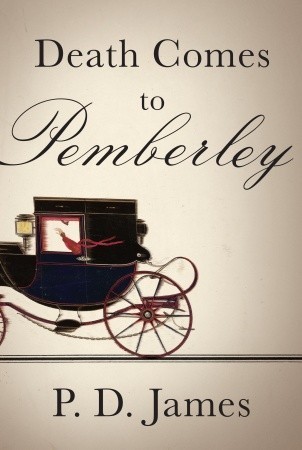
Pride and Prejudice with a murder mystery written by the great P. D. James. This book had everything to be a blast and it felt so flat on every front.
The characters we know and love from Pride and Prejudice are boring caricatures of themselves, the mystery was dull and resolution equally boring.
This was a bad fanfiction from start to finish. What a waste!
The Cinderella Murder by Mary Higgins Clark and Alafair Burke

A bit of context. Mary Higgins Clark was my favorite mystery author when I was a teenager. I collected all the books I could find and read them on the same day. They were compelling and easy to read.
As I grew up and started reading other books by different authors, I found myself looking for more complex themes and characters.
Clark’s books are good and simple, just like her characters, but they were too simple for my adult tastes now. The good guys are practically saints, the bad guys are evil. They became too flat for me to truly enjoy like I used to.
The mystery part is fine, but I can’t for the life of me remember the plot or the ending a few months after reading the book. A forgettable book is sometimes worse than a bad book. It left no impression on me.
The Magicians by Lev Grossman
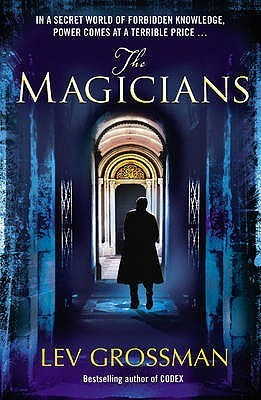
DNF (Did Not Finish) around page 200
Long story short, this book wasn’t for me.
The premise looked very interesting. People are tested and only the very best get sent to a prestigious magic school, it looks like Harry Potter in college and, sure enough, it is a lot more mature.
But the plot was all over the place. The main character, Quentin, was such a boring and annoying protagonist that staying inside his head was giving me a migraine. His lack of interest on anything unless it’s magic related or the Fillory books seriously pissed me off.
The plot felt rushed and very weird at several parts of the book. I lost interest. I don’t care about the characters, the magic or the weird sex stuff happening in animal form.
I’m out!
And finally, it pains me to announce my number 1 worst book of 2018. I can handle bad books or forgettable books, but this was my most anticipated book for 2018, from a series that I love with all my heart. It let me down so much...
The Testament of Loki by Joanne Harris
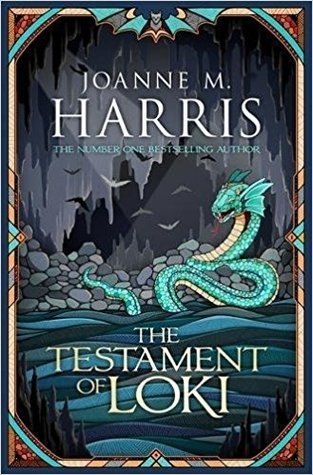
Now, let me say this isn't a bad book, it was well written and ties the events between Gospel, Runemarks and even Runelight quite well. I'm glad this book promoted a bit of friendship between Loki and Thor.
My disappointment with this story was mostly due to my dislike of the whole body sharing, switching and stealing, which I personally hate.
Also, Loki's love for Meg felt rushed and confusing, as if it was only there to give Jumps a girlfriend and a damsel in distress for them to save. Meg was nice and BAM, both Loki and Jumps were in love with her. What? Are we talking about the same Loki from Runemarks? I know human emotions were influencing him and all, but that was one of the worst cases of insta love I have ever seen.
And the fact that Jumps’s eating disorder and other mental health problems get resolved because Loki makes her eat pizza and gives her a makeover. That is not how mental disorders work, not by a long shot.
The human characters were flat, merely vessels for the gods to inhabit. Evan is his disability, Stella is a shallow beauty, Meg is nice and likes girls, and Jumps, the human girl sharing her body with Loki, was little more fleshed out but, honestly, aside from her problems with her body image and her sexuality, I can’t remember anything about her. I really wish this sequel didn’t happen inside a YA contemporary novel.
This isn't a bad story, but it fails to capture the magic and wonder I felt while reading Runemarks.
#books#worst books#joanne harris#the testament of loki#the magicians#lev grossman#mary higgins clark#p.d. james#pride and prejudice#jenna moreci#the savior's champion#caraval#stephanie garber#the fandom#anna day#shatter me#tahereh mafi
28 notes
·
View notes
Text
this is realllllly long and just a venting post which i doubt anyone will actually read but.....anyways it has to do with idols and sex/sexuality etc....
........................

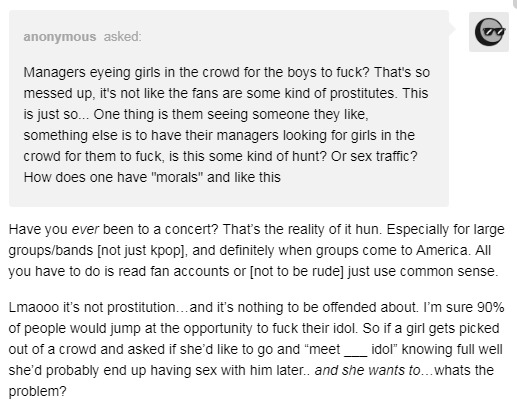
........................................................................................
I don’t usually post opinions about shit kpop fans do but this shit is so gross???LIKe????? Like ......alright I’m not a naive person by any means and I’ve heard that about western band members having groupies etc and shit but why the hell are people so cool with this shit and dismissive about the possibility fans getting treated like groups personal brothel?? (Especially with all the underage girls OMG).... Like I may say this and that member is sexy etc. and thirst over them but dear god I’d would NEVER like being seen as just some sex object that is there at some groups disposal. (also It grinds my gear how op just assumes the majority of fans would actually sleep with their idols like???) And even if it is consensual it doesn’t inherently make something okay, especially when there are power imbalances and where there is a case of impressionable young girls that might get easily manipulated by a famous persons influence ( actually it doesn’t matter the age that’s just such a sleazy thing to do.) And how is that not objectifying????LIKE HOW??? And please miss me with the “ iF iTs a ChOIce It’s emPOwering “ bullshit because while the hypothetical situation in which a fan DID consent to sleeping with a group member is MILES BETTER than her being forced to do sexual activities without consent, it’s not inherently empowering. It’s just, at fucking best, not the worst shit that could go down. It’s also not empowering especially when said idol/band member would have probably literally looked at a crowd , pointed at you unfazed and said some shit like, ” I want that one” , reminiscent of picking out a sex toy at some adult themed store. Honestly this is just a personal opinion but I genuinely believe that opportunistic men that use their fame to sleep with women aren’t good people.They just see women as objects (it doesn’t matter whether consensual or not) and are no different then your average misogynist fuckboy, they just have influence and might feel even entitled or smug that they might get to sleep with whomever they want because of fame. Like I could talk about sex positiveity for women all day but no matter how I spin it, at the end of the day I know men aren’t gonna give a flying fuck about my sexual freedom and just see my own potential consent to as convenient for them to get some pu**y. ( ANYWAYS this kinda feels like I went on a tangent I just wanted to address the fact that people will let anything fly when it comes to women being objectified under the guise of consent ~ )
Also another thing is that I find it really weird as hell whenever people talk about idols sexual habi- oh wait a minute *clears throat* , I mean HYPOTHETICAL sexual habits as if they know them and could actually decipher how they would act in a said situation out of like....them acting sexy or their personality..... AND they speak so presumptuously and un-ironically about these things and it blows my mind. Like, for example, just because I’m in a certain age and can act sexy for like some skit or dance doesn’t mean a person knows FOR CERTIAN any shit about my sex life, beliefs,kinks , sexual habits etc, you name it.... And what really bothers me is when ANYONE acts like they KNOW better than anyone else about ANYTHING related to an idols sexuality . By this I mean people on the extremes that say vulgar and disturbing shit like op above by talking down on people and saying fans are naive~~ and that idols probs get lots of puss*Y !!!111111 to the other end of of the spectrum where there are people who think that oppa/unnie are innocent virgins that have never had any sexual thoughts. Both are problematic and just should stop talking about people’s sex life as if they know them. ( and that includes obsessing over somethings sexual orientation and saying they KNOW when someone is XY or z because they fit into a stereotype....even though people like to preach that you should’t assume orientation because of these things????)
I’ve had something similar happen to me and I can tell you that 1. They were dead fucking wrong about their assumption and 2- It felt invasive as hell and made me uncomfortable, plus....... even if they were right it just feels really off-putting having someone MATTER OF FACTLY talk about something sexual related to you as if they know shit about you ,when they don’t.
Lastly, I wanted to point out this bad habit of kpop fans projecting onto their faves all these things related to sexuality. I’m really bad at explaining this but it goes beyond just thirsting on their faves ...., it goes into territory that seems really objectifying to me where sometimes a fandom will push this narrative (im not sure if I’m using the right word) or characterization of an idols personality just to suit their sexual fantasies or wishful thinking. I’ve seen this in fanfiction and from personal experience have been in a fandom that distorted an idols image to suite this hyper-sexualized cute UWU baby boy that is simultaneously infantilized ( which is wierd and ANOTHER topic for another day....) and it really disturbs me to the point where I can’t look at some of said idols material in peace. And I know I’m not making a mountain out of a molehole when it comes to associating how fandom chooses to collectively present an idol via fiction (especially sexually) because it does have an effect on reality. Like there has been actual studies on how fictional portrayal can affect reality ( i saw a post but i don’t have a list/links.) Also I’ve legitimately seen people say shit like “ I thought x member was like *insert personality trait* because of how he was portrayed in fan-fiction but found out that he is an actual sweetheart irl” and other things to that extent. Also posts joking around how so and so are portrayed like “x” in fanfic when they are actually ‘different’ in reality. It just makes me think that it’s really telling on how how a lot of times people will use idols as these characters that they can project their kinks on and sexualize and how much indulgence i see in this is iffy.
( and now this is just extra and shady as hell ngl and just some thought I’ve had....but I also always find it interesting how people on this site will talk shit about fuckboys saying they ain’t shit etc but then project that very same fuckboy image that they say they hate on some random ass idol JUST because X idol ACTs flirty and confident for fan-service like??? and its even all the more interesting considering how idols mostly have this wholesome/pure~~ image but kpop fans like taking that and doing the most, just completely deconstructing it ... bonus points if the ones projecting the fuckboy image onto an idol are also the ones telling and insisting to other fans they are stupid for believing that idols are pure~ Like why do these type of fans latch onto kpop idols that as a whole have a “clean” image just to do the complete opposite and insist otherwise??? Like I makes me wonder... if male kpop idols DIDN’T have a nearly squeaky clean image from the get go, would they have spent all this time fawning over them??? and projecting this “ X idol is secretly a fuckboy sexual fantasy” the way the do now?? Like why do people get so ecstatic over the idea of idols being fuckboys when they could just like ....entertain the average ass that they probably have dealt with in in their daily lives???)
(anyways this turned long but these thought are all connected somehow but my another reason for typing this is because if fans are just there to just potentially fuck idols it kinda reinforces the idea that idols are just famous because teenage girls go ape shit over heartthrobs or whatever and not like , cuz the idols are talented and people enjoy there performances???? also the whole standing in line for the opportunity to fuck an idol just goes hand in hand with the whole being a fan that thinks they have a chance to date their idol and is delulu ( actually this is worse yuck).... and i definalty wouldnt want people looking at me like I only enjoy kpop cuz i want my favs dick because kpop fans get viewed in a bad light already.....
#personal#damn this is all over the place and im gonna get unfollows but.....#*sighs*#venting#i didnt reread or proofread so if anyone ACTAULLY tries to read this im srry#also i blocked this person
6 notes
·
View notes
Text
Author Tochi Onyebuchi Brings Anime-Inspired Giant Robots to Nigeria in War Girls
https://ift.tt/324kkoQ
We talked to speculative fiction author Tochi Onyebuchi about novellas War Girls and Riot Baby.
facebook
twitter
tumblr
Tochi Onyebuchi brings a keen eye for world-building and momentum-filled action scenes to his young adult novels. From the Pokémon-like Beasts Made of Night duology to the upcoming fantasy novella Riot Baby, he’s making waves. At NYCC 2019, we sat down to talk to him about pop culture influences, the process of building a novel, and how he wants to push back against Western perceptions of African countries.
Riot Baby will be available from Tor.com in January 2020. War Girls comes out on Oct. 15 from Penguin Random House.
Den of Geek: Your latest book, War Girls, is a post-apocalyptic story involving both catastrophic change and nuclear war. What draws you to writing apocalypse while the real world feels so apocalyptic?
Tochi Onyebuchi: Part of it is coping! Part of it is trying to imagine my way through crisis. Because the thing about climate change, or at least the discussion as it is happening now, has been very much dominated by Western voices. It has been very much focused on climate change in parts of the U.S., for instance. Or efforts to combat climate change in Western Europe. Whereas a lot of the really averse effects of climate change will most viscerally be felt on the African continent.
We’re already seeing it. You see the desertification of the Sahara. And that is pushing people on the lower end, particularly nomadic tribes, further down into densely populated countries. And so you see all this unrest that’s happening right now in northern Nigeria, because you have pastoral Fulani tribes that are being pushed down into farmland that is already populated by people. So all of a sudden there are these new clashes over land rights that would not necessarily have happened were it not for climate change.
There are islands in the Pacific that are sinking. That won’t be here in 12 years or 20 years. So I was very interested in what people in those places would consider with regards to climate change. So that was why it was particularly interesting to think about issues of climate change and post-nuclear disaster in Nigeria.
Tell us about the two sisters at the heart of the book. What made their story compelling?
They both carry aspects of my mother. War Girls very much has its genesis in stories that I would hear from her of her time as an internally displaced person in the Biafran war, the Nigerian civil war, that waged in Nigeria from 1967 to 1970. She was either just finishing or just getting ready to start kindergarten at the outbreak of the war. She was a child living through this! That in many ways was the genesis of the book.
I wanted to also write in a way about a lot of the other civil conflicts that raged throughout African countries in the 1990s and early 2000s and mid 2000s, and that’s where the issue of child soldiers comes in. Child soldiers weren’t necessarily prevalent in the Nigerian civil war in the 60s and 1970, but in a lot of the later conflicts in the 90s and the 2000s you saw prevalence of the instances in which adolescents and teenagers would be drawn into the conflict and faced to fight, forced to kill. I think particularly of the story of Beasts of No Nation by Uzodinma Iweala, which was made into an extraordinary movie starring Idris Elba. It’s that sort of thing.
How do you deal with that afterwards, too? As a society, but also as the person who did those things. Because there is an after. There will be an after. What does that look like? Those are very fascinating questions to me.
War Girls is set in an alternate Nigeria. What kind of research or experiences lead to the way you portrayed it?
While I did a lot of research on Nigeria, particularly the Biafran war, I also wanted to do a lot of research on other African countries. But one thing I wanted to make sure of was I wanted to write a specifically Nigerian story. And part of that entailed researching both conflicts and histories of other African countries.
One thing that I wanted to do also was make sure this wasn’t a doom-and-gloom, ‘everything is horrible in Africa’ story. Because a lot of the popular perception of Africa is it’s this entire uniform place that’s universally afflicted by starvation and civil war. It’s the picture of the kid with flies on their face and the bloated stomach from malnutrition. But there are 50-plus countries in Africa, many of whom have exponentially more ethnic identities in them. There are over 200 tribes in Nigeria alone. So that speaks to the diversity on every scale, whether it’s economic, social, tribal, what have you. It speaks to the overwhelming diversity of the continent. And that was something I wanted to get at.
So, in researching other countries and other traditions, it became easier for me to pick bits from other cultures but use them specifically, and not just have them be this background of ‘African traditions’ and what not thrown into the story. It was very important to me that the story was specific, the references were specific, the geography was specific. That is a lot of what drove the research that I did.
War Girls is marketed as Black Panther inspired. Tell me more about this connection and about what pop culture influences you.
One of the reasons Black Panther was so important, particularly to War Girls, is that it provided a reference point for a lot of people that might not have been familiar with a lot of the things that are going on in that book. War Girls is very much more inspired by Gundam Wing. I’m a huge, huge Gundam fan, so this book is very much a love letter to Gundam. When I pitched it to my agent, it was ‘Gundam in Nigeria.’
But at the same time I recognize that there’s a maybe somewhat limited fandom for Gundam. I feel like in the United States more people would recognize Black Panther. One of the beautiful things about it was that people could see Black Panther and have a reference point for this depiction of Africa as technological advanced. That, I think, was new to a lot of people. To see an Africa that maintains fidelity to certain traditions, and had high speed rail. That had hover cars. That had spaceships and what not. But also had specific music and dance traditions and fashion sense.
So, in crafting a society that had all those things, it’s easier for people to understand.
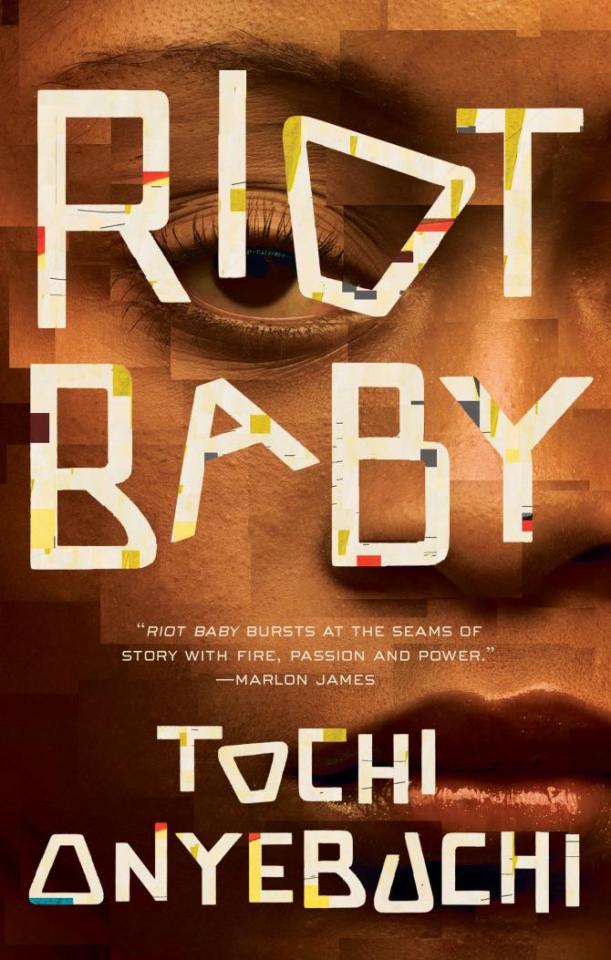
What is the idea at the core of Riot Baby, your upcoming novella?
Riot Baby is the story of Ella and Kev, two siblings that grow up in the shadow of the L.A. Uprising in the 90s. Their story takes them from South Central, to Harlem, to Riker’s, and back to the Watts, and they have to deal with institutional racism and police violence and issues surrounding mass incarceration, while slowly discovering superpowers.
What have you learned about writing in the course of publishing four novels?
I’ve gotten much better at my act threes! [Note: Some of the audio in this section was disrupted. The author goes on to discuss gaining sensitivity to the quality of his own writing.]
You can write something and you can feel that it’s right, even though you may not necessarily be able to articulate all the ways in which you feel it’s right, or why this particular choice is the correct one. You can direct the plot a certain way and feel you’ve made absolutely the right choice without necessarily knowing why. Developing that intuition after having internalized so much of the craft is very important. That’s an aspect of writing I’ve grown in.
What is your process like? Do you outline?
It often differs by book, and also by the relationship with whichever editor I’m working with at the time. Riot Baby came together in part out of disparate pieces of existing work, and then when it coalesced it grew more of itself. There wasn’t necessarily an outline involved in that. It started with writing pieces of it and the spine of the narrative came together. Then, the rest was a result of growing it out.
Whereas with War Girls it was very schematic. I had the idea, I had a bucket of particular images in my head I wanted to figure out how to dramatize. Out of that came the outline, which of course changed shape over the course of the drafting. So I had the initial outline and then a revised outline. Then I started drafting, and events changed as I was writing.
Would you say to an aspiring writing that process matters? Do you need to write a certain way, or do different ways work for different people?
Whatever works, works. I think that’s the way to go. There is the temptation to fall prey to a lot of the dogma early on, particularly when you’re trying to figure yourself out with regards to voice, process, how to make this writing thing work.
We hear people say write every day. But that’s not feasible for a lot of people. Whether it’s their school schedule, whether it’s child care, whether they have a particular job that doesn’t allow for that. People are dealing with different realities, so writing every day isn’t necessarily universally applicable.
The only thing I feel confident in terms of advice to aspiring writers is to love writing. Whether it’s the act of putting sentences together, playing with that, or whether it’s the larger discipline of storytelling, certain aspects of that—if that gets your heart racing, if that gives you the same feeling as when you see your crush from across the room, that’ll get you so far in this. Because there’s so much nonsense you have to deal with in this, and so much conflicting advice. If at the end of the day you love doing this thing, hold on to that. That’s why you do this.
You can find out more about Tochi Onyebuchi here.
Read and download the Den of Geek NYCC 2019 Special Edition Magazine right here!
facebook
twitter
tumblr

Interview Megan Crouse
Books
Oct 10, 2019
from Books https://ift.tt/2q3NW7P
0 notes
Text
Queer Self-Presentation and Burlesque Auto-Sexuality in Yuri Plisetsky’s “Welcome to the Madness”
PHEW! It’s finally ready for ya!
Thanks to everyone for patiently waiting. I was overwhelmed with the response to my teaser post about this meta. I’m sorry it took so long to finish... I had to write the academic version for class, then rewrite it to be tumblr-appropriate (I’m still not sure that it is, constructive criticism is welcome!)
I’m hoping that this will contribute to the ongoing conversation about underage characters in fandom, and am looking forward to your asks. I’m a little nervous to be tossing my hat into the Otayuri discourse, but I hope I won’t catch too much hate.
I took out footnotes but included the bibliography at the end. If you have any questions about specific references, send me an ask or DM :)
Enjoy!
(2272 words)
This meta considers how we might safely and healthily engage with Yuri Plisetsky’s sexuality and consequent YOI fandom shipping practices. I am interested in Yuri’s self-presentation as a sexual subject “Welcome to the Madnes,” taking seriously both sides of the Otayuri debate (because I think it’s unavoidable with WttM). I will analyze WttM as a kind of burlesque performance that highlights his auto-sexuality and provides opportunity for him to express his developing (queer) identity.
WttM presents gender, sex, queerness, and adolescence in conversation together, and these categories must be recognized as social constructions. Because the intersection of sex and adolescence is plagued by anxieties about violence, I deliberately approach sexual activity as generally positive in the absence of explicit abuse to avoid essentializing adolescent sexual experiences.
I take a cultural studies approach in this meta, recognizing that representations of fictional characters can have real-life effects, in this case meaning that both YOI and fandom practices have consequences for people IRL. Popular culture provides opportunities for individuals to understand and mediate their own intersecting identities, and this process can also have negative effects when problematic and even dangerous activities and relationships are normalized.
Therefore, any discussion of popular culture must foreground a social justice-oriented approach that points out connections to political and social contexts. We all conform and rebel against mainstream culture through our engagement with popular culture, and along with the potential negative effects mentioned above, this can also provide opportunities for self-empowerment.
Adolescents are expected to rebel against authority figures and engage in subcultures, all while navigating their way to an acceptable, stable identity by the time they reach adulthood. Yet their behavior is safely contained by adult authority. Yuri subverts this authority by producing his own exhibition skate.
As @otayuribekayura puts it:

@otayuribekayura posted this before we found out from the PASH! Interview how accurate it actually is. As predicted by much of the fandom, Yuri produced the exhibition himself, and as a result, this is the first time we see Yuri’s punk/emo aesthetic reflected in his skating.
Emo, as both a youth subculture and personal aesthetic choice, is a rebellious, sometimes anti-social, and attention-seeking mode of identity presentation (Sound like someone???). It relies on mutual rejection between the emo individual and mainstream culture, resulting in stronger bonds to and greater authority for the individual within the subculture. Emo also provides opportunities for expressing desire, typically coded as queer, by rejecting both heteronormative and homonormative expressions of sexuality.
The emo boy’s androgyny and visible otherness stands in for the invisibility of his sexuality. A number of the skaters, including Yuuri and Viktor, demonstrate a somewhat fluid gender presentation as well, but Yuri’s masculine-yet-androgynous emo/punk self-expression is unique in the anime.
Given the sexually suggestive nature of WttM, I characterize Yuri’s performance as a kind of burlesque, which I am defining as a conscious performance of gender and sexuality, set to music, that typically involves the performative removal of clothing. A key reason for this is the choice of music. Otabek chose for Yuri an electric, screaming, hard rock number that sounds like it is based on “Welcome to the Jungle” by Guns ‘N Roses. Burlesque performers similarly choose music based on their own personal tastes, using the signifying power of music, both as a contained object and its broader cultural context, to reference specific identities and orientations.
In choosing this song, Yuri shifts the character for his skating repertoire along with expectations for his future programs. In this way, Yuri’s burlesque performance gives him a kind of authority that previously belonged to his coach and choreographers. Yuri’s choices for this exhibition connect his on-ice performances to his off-ice punk/emo personality. The effects of his burlesque also cross this divide; Yuri demands recognition as a sexual subject off the ice.
Deborah Tolman defines sexual subjectivity as “a person’s experience of herself as a sexual being, who feels entitled to sexual pleasure and sexual safety, who [can] make …active sexual choices, and who has an identity as a sexual being,” and emphasizes the importance of sexual desire. For some fans, Yuri’s age brings his sexual agency into question.
Age, as a social construct, imparts false narratives of natural and normative development on youth, who are expected to perform their age in particular ways. These performative acts and behaviors are supposed to correspond to the physical development of the body. As a result, an adolescent’s maturation may appear exaggeratedly fast or slow if they behave in a way that is out of line with this normative timeline, especially in relation to their physical growth and maturity.
Despite these inconsistencies, adolescence is known to be a period of sexual awakening regardless of one’s physical development, yet adolescents are denied access to this sexuality and its expression. Adolescents’ sexuality is systemically controlled by adults, as the responsibility for their welfare has extended and expanded both in time and scope. Adults are conditioned to continue seeing young people as children even when they are mid- and post-puberty.
Adolescent sexuality, therefore, threatens the adult/child binary and the “invention of childhood,” which relies on the assumption that sexuality necessitates the end of childhood, therefore children should be prevented from expressing any sexuality at all. Children are expected to follow a supposedly natural progression from asexuality to heterosexuality, and they may be considered queer not only if they defy heteronormative standards of desire, but also if they display sexual desire too early in the progression, regardless of whether or not said desire manifests as homosexual. With asexuality as the norm for children, any expression of sexuality becomes queer.
Jack Halberstam’s book In A Queer Time and Place considers the ways in which expectations of reproduction impact individuals’ progression through life, especially during young adulthood. Queer folks defy these timelines, blurring the divide between adolescence, young adulthood, and adulthood. Navigating sexuality, a priority for most adolescents, becomes an even greater necessity for queer-identifying youth seeking authentication and community.
Community is key for queer identity development, as Jason Torkelson speculates that “less conforming individuals’ understandings of their own adulthood might be affected by predominant standards, since the extent to which they may or may not even perceive the ability to obtain adulthood in the first place can potentially be brought into question.” Access to queer community allows for young people to discover possibilities for their futures.
The intersection of adolescence and queerness, therefore, presents enormous challenges to teenagers who are coming to terms with their sexuality and navigating their personal expressions of sexual subjectivity, especially if they are prevented from entering queer spaces while they are still expected to be “asexual” “children”.
Ultimately, the inability to recognize the sexual subjectivity of queer adolescents may stem from individual or cultural queerphobia.
As a professional athlete and performer, Yuri’s understanding of his own identity is tethered to what he presents on the ice. By taking control of his exhibition program and defying the expectations of his mentors and the audience, he skates WttM as an act of auto-sexuality, “an expression of free sexuality which has no object but itself.”
Though he performs for an audience—therefore subjecting himself to the gaze of both the audience at the Grand Prix Final and the anime audience behind their screens—Yuri exerts power and control over his self-presentation in performance, subverting the vulnerability that usually accompanies the gaze of spectators.
Yuri’s defiant auto-sexuality is characterized by a healthy commitment to self-care, the act of prioritizing one’s own wants and needs. By expressing himself honestly and completely, Yuri presents an accurate portrait of himself to his fans while demonstrating an intimate self-knowledge. Notably, establishing relationships with others is a primary ingredient in self-care.
I don’t think it’s a coincidence that Yuri gains the confidence to pursue his own interests in his exhibition skate after making his first friend. In other words, Otabek’s influence is present in more than the selection of music. Their mutual interests allow Yuri to gain greater confidence in his identity and, therefore, sexual subjectivity (even if their relationship is strictly platonic). It is this intimate contribution to Yuri’s sense of self that I think makes the possibility of romance between these two characters so appealing, rather than merely a desire to see them interact sexually.
Concerns about adult-child sex in fandom are subject to extremes of moralizing and condemnation. A number of studies have shown, however, that assumptions that sex between adults and minors is inherently, necessarily harmful are unsupported by scientific evidence. This does not deny the ever-present possibility for abuse in such relationships, a possibility that is statistically higher than in other kinds of sexual and romantic relationships. But in the absence of abusive behaviors, these relationships are not necessarily problematic (regardless of legislation, which I’m not even going to bother discussing here).
The stigma of adult-minor relationships is especially strong for queer communities, due to accusations of pedophilia, fear of the seduction of young boys by queer men, and the implicit homophobic assumption that an individual can be “turned gay” through forced sexual activity. Lydia Kokkola confronts this provocative issue by arguing:
For many, both within and outside the queer community, ‘man-boy love’ is simply an attractive name for sexual abuse … For others, the majority of whom enjoyed their first sexual encounters with someone considerably older than them, it is offensive to assume that these acts were not volitional. In the end, the matter comes down to the issue of what constitutes informed consent, and at what age a person is capable of informed consent. Since individuals mature at different rates, the latter issue cannot be resolved, which places even greater onus on us to discuss what constitutes informed consent. It takes a very brave individual to face the public scandal of supporting adolescents’ right to choose to have sex with people much older than themselves, but we must do so—at least provisionally—if we are to understand what ‘informed consent’ means for those making such decisions. Blanket assumptions that teenagers cannot make informed consent about sex affects adolescents’ autonomy in ways that may have far reaching consequences.
If we accept that minors are capable of giving informed consent, we must accept that they are also capable of enjoying their consensual sexual experiences with adults regardless of age gap. Instead, these accounts are often ignored and assumed to be the result of manipulation or trauma.
As adolescents’ understandings of their own sexual experiences are ignored, leading to the kinds of “far reaching consequences” to which Kokkola alludes. When narratives “are grounded in discourses that rely on un-safety, the possibilities for even imagining what safety might mean are constrained by the discourses.” We do a disservice to young people when we deny them appropriate agency and ignore accounts of their experiences.
Infantilizing adolescent characters often emerges from the assumption that all children are affected by media in the same way. While the normalization of child sexual abuse is of course detrimental, so is the assumption that all adult-minor relationships necessarily constitute abuse. Thus, the presentation of a variety of possibilities can be beneficial, especially for those navigating queer identity.
The reasons behind the Anti-Otayuri movement are clear: fans are earnestly concerned with the depiction of relationships between characters whom they believe are at life stages that are too far removed from one another to be healthy. While I disagree for a number of reasons, I understand these anxieties. I too harbor some discomfort with art depicting Yuri in sexual situations when he is still underage.
I think the less obvious question is: What is at stake for fans who ship Otayuri? What is so meaningful about this ship that they continue supporting it despite backlash?
The answers will of course be different for each shipper. And I’m not sure I have anything good to say about this because my analysis is mostly about Yuri as an individual. But here are some closing thoughts.
First, it is important to recognize that the narratives told and images shared by fans should not be assumed to be based on actual events and are not indicative of a desire to pursue such behaviors in real life.
Second, many Otayuri shippers are in fact quite young, perhaps around Yuri’s age, so interest in his sexuality is entirely appropriate. Young fans’ interests in sexual narratives is healthy and educational, and fans “in the interstitial stage between age of consent and age of majority are inhibited … from exerting ‘control’ over representations of their bodies,” leaving fandom as an important space for exploring such representations. Further policing of sexual desire online may have harmful effects on young people’s maturation.
Third, adult fans may mediate their readings of underage sexuality autobiographically, processed through their own memories of adolescent sexuality. Age, as a social construction, does not inhibit identification, so a fan may relate to a character like Yuri regardless of age, or through their remembrances of themselves at his age. I certainly see in Yuri a lot of what I experienced and struggled with when I was a teenager.
While the conflict over Yuri’s sexual subjectivity is unlikely to be resolved, a more nuanced cultural studies-based understanding of media engagement and adolescent, queer sexualities may allow for more empathetic interactions between fans of differing opinions.
Regardless of how you feel about Otayuri, I hope that we can all at least acknowledge Yuri’s auto-sexuality in WttM and beyond. The point of sharing this analysis is to give Yuri his rightful agency in fandom, and in WttM, he is insisting on it. And something I think we can all agree on: nothing good can come from ignoring Yuri Plisetsky.
Thanks so much to everyone who sent encouragement and thoughts. I really appreciate it. Thanks to @otayuribekayura and @kobuta-katsudon for giving me permission to use their posts (although I didn’t end up using the latter’s, sorry about that)!!
Bibliography
Balay, Anne. “‘Incloseto Putbacko’: Queerness in Adolescent Fantasy Fiction.” The Journal of Popular Culture 45, no. 5 (October 2012): 923–42.
Binnie, Jon, and Christian Klesse. “The Politics of Age, Temporality and Intergenerationality in Transnational Lesbian, Gay, Bisexual, Transgender and Queer Activist Networks.” Sociology 47, no. 3 (2013): 580–95.
Brennan, Joseph. “‘Fandom Is Full of Pearl Clutching Old Ladies’: Nonnies in the Online Slash Closet.” International Journal of Cultural Studies 17, no. 4 (July 2014): 363–80.
Brown, Maria T. “LGBT Aging and Rhetorical Silence.” Sexuality Research and Social Policy Journal of NSRC 6, no. 2 (December 2009): 65–78.
Cramer, Janet M. “Discourses of Sexual Morality in Sex and the City and Queer as Folk.” The Journal of Popular Culture 40, no. 3 (June 2007): 409–32.
Devitt, Rachel. “‘Keep the Best of You, “do” the Rest of You’: Passing, Ambivalence and Keeping Queer Time in Gender Performative Negotiations of Popular Music.” Popular Music 32, no. 3 (October 2013): 427–49.
Dodds, Sherril. “Embodied Transformations in Neo-Burlesque Striptease.” Dance Research Journal 45, no. 3 (April 2014): 75–90.
Free, Melissa. “Relegation and Rebellion: The Queer, the Grotesque, and the Silent in the Fiction of Carson McCullers.” Studies in the Novel 40, no. 4 (2008): 426–46.
Gibson, Brian. “Falling for Innocence: Transchild Freedom vs. Adult Judgment in Tomboy and Ma Vie En Rose.” Children’s Literature 44, no. 1 (June 2016): 219–37.
Hackford-Peer, Kim. “In the Name of Safety: Discursive Positionings of Queer Youth.” Studies in Philosophy and Education 29, no. 6 (November 2010): 541–56.
Halberstam, Judith. In a Queer Time and Place: Transgender Bodies, Subcultural Lives. New York: New York University Press, 2005.
Hannerz, Erik. Performing Punk. New York: Palgrave MacMillan, 2015.
Hodkinson, Paul, and Andy Bennett. Ageing and Youth Cultures: Music, Style and Identity. London: Bloomsbury Publishing, 2013.
Hubbard, Thomas K. “Sexual Consent and the Adolescent Male, or What Can We Learn from the Greeks?” THYMOS Journal of Boyhood Studies 4, no. 2 (Fall 2010): 126–48.
Janssen, Diederik. “Re-Queering Queer Youth Development: A Post-Developmental Approach to Childhood and Pedagogy.” Journal of LGBT Youth 5, no. 3 (July 2008): 74–95.
Janssen, Diederik Floris. “Sex as Development: Curriculum, Pedagogy and Critical Inquiry.” Review of Education, Pedagogy, and Cultural Studies 31, no. 1 (January 2009): 2–28.
Jenkins, Henry. Textual Poachers: Television Fans and Participatory Culture. New York: Routledge, 2013.
Jenkins, Henry III, Tara McPherson, and Jane Shattuc. Hop on Pop: The Politics and Pleasures of Popular Culture. Durham: Duke University Press, 2002.
Jones, Sara Gwenllian. “The Sex Lives of Cult Television Characters.” Screen 43, no. 1 (Spring 2002): 79–90.
Kincaid, James Russell. Erotic Innocence: The Culture of Child Molesting. Durham: Duke University Press, 1998.
Kokkola, Lydia. Fictions of Adolescent Carnality: Sexy Sinners and Delinquent Deviants. Amsterdam: John Benjamins Publishing, 2013.
Lothian, Alexis. “Archival Anarchies: Online Fandom, Subcultural Conservation, and the Transformative Work of Digital Ephemera.” International Journal of Cultural Studies 16, no. 6 (November 2013): 541–56.
Maira, Sunaina, and Elisabeth Soep. “United States of Adolescence?: Reconsidering US Youth Culture Studies.” Young 12, no. 3 (August 2004): 245–69.
McLelland, Mark. “‘Not in Front of the Parents!’ Young People, Sexual Literacies and Intimate Citizenship in the Internet Age.” Sexualities 20, no. 1–2 (February 2017): 234–54.
Meyer, Michaela D., E, and Megan M. Wood. “Sexuality and Teen Television: Emerging Adults Respond to Representations of Queer Identity on Glee.” Sexuality & Culture; New York 17, no. 3 (September 2013): 434–48.
Miller, Daniel. “Absolute Freedom in Trinidad.” Man 26, no. 2 (1991): 323–41.
Nylund, David. “Reading Harry Potter: Popular Culture, Queer Theory and the Fashioning of Youth Identity” 26, no. 2 (2007): 13–24.
Owen, Gabrielle. “Toward a Theory of Adolescence: Queer Disruptions in Representations of Adolescent Reading.” Jeunesse: Young People, Texts, Cultures 7, no. 1 (August 2015): 110–34.
Peters, Brian M. “Emo Gay Boys and Subculture: Postpunk Queer Youth and (Re)thinking Images of Masculinity.” Journal of LGBT Youth 7, no. 2 (May 7, 2010): 129–46.
Regehr, Kaitlyn. “The Rise of Recreational Burlesque: Bumping and Grinding Towards Empowerment.” Sexuality & Culture 16, no. 2 (June 2012): 134–57.
Reid, Robin Anne. “Thrusts in the Dark: Slashers’ Queer Practices.” Extrapolation 50, no. 3 (January 2009): 463–83.
Rind, Bruce. “Social Response to Age-Gap Sex Involving Minors: Empirical, Historical, Cross-Cultural, and Cross-Species Considerations.” THYMOS Journal of Boyhood Studies 4, no. 2 (Fall 2010): 113–25.
Rosky, Clifford J. “Fear of the Queer Child.” Buffalo Law Review 61 (2013): 607–98.
Saito, Kumiko. “Desire in Subtext: Gender, Fandom, and Women’s Male-Male Homoerotic Parodies in Contemporary Japan.” Mechademia 6 (2011): 171–91.
Sinwell, Sarah E. S. “Mapping the (Adolescent) Male Body: Queerness, Pedophilia and Perversion in L.I.E. and Mysterious Skin.” THYMOS Journal of Boyhood Studies 7, no. 2 (Fall 2013): 141–55.
“The (Re)Searching of Queer Youth.” Journal of LGBT Youth 5, no. 3 (July 2008): 1–3.
Tolman, Deborah L. “Female Adolescents, Sexual Empowerment and Desire: A Missing Discourse of Gender Inequity.” Sex Roles 66, no. 11–12 (June 2012): 746–57.
Torkelson, Jason. “A Queer Vision of Emerging Adulthood: Seeing Sexuality in the Transition to Adulthood.” Sexuality Research & Social Policy; Berkeley 9, no. 2 (June 2012): 132–42.
Willson, Jacki. The Happy Stripper: Pleasures and Politics of the New Burlesque. London: I.B.Tauris & Co., 2008.
Yuill, Richard. “Interrogating the Essential: Moral Baselines on Adult-Child Sex.” THYMOS Journal of Boyhood Studies 4, no. 2 (Fall 2010): 149–67.
709 notes
·
View notes
Photo
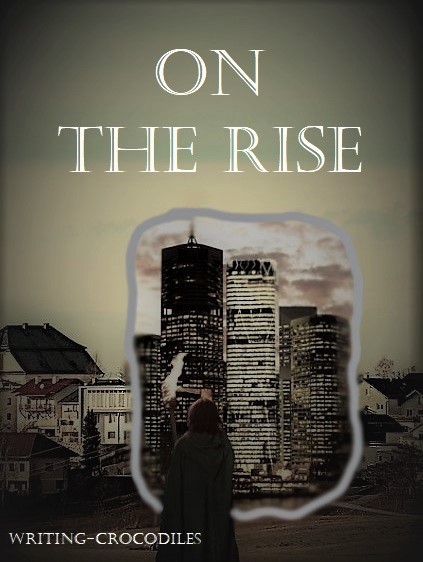
Fandom: Once Upon A Time
Pairing: Rumbelle
Rating: T
Summary: After stabbing Zoso, Rumplestiltskin encounters a young girl that claims to be the entity of the Darkness. She says she hasn’t truly accepted him as the Dark One yet and that he will need to prove himself. During his journey to do so, he meets a young woman named Belle French. Can he convince her he’s an upstanding gentleman, all the while darkening his heart so he may save his son?
Chapter 1 - Chapter 2 - Chapter 3 - Chapter 4 - Chapter 5
Chapter 5- Opposites Attract- Support and Refutation
The next day Rumple awoke to find that, much to his dismay, he had no clean shirts left. He gathered his clothes, ignored the breakfast Keriam had made and set out for him, and trudged downstairs in his pajamas.
Hopefully it was early enough in the morning that Belle wouldn’t be busy with laundry. All he wanted to do was avoid the whole mess. How she didn’t tell him about Gaston, why she was with Gaston in the first place, how much does Gaston bench press and why he is so much better. What? What could possibly be his appeal?
He made it to the laundry room, pushing the door open with more force than necessary, and listening to the satisfying bang as it hit the inner wall. Belle was there, also wearing her pajamas, reading a book at the base of a running washer. She looked up as he came in and didn’t shrink under his evident scowl.
“Good morning,” she said.
“Morning,” he answered far less cheerfully. He walked past his usual row and went to the furthermost corner of the large room. In said corner was a washer that looked like it hadn’t been used since the Ogres War started. The paint had been scraped off in several places, showing the underlying silver. It looked like it might fall apart, but it was as far away from Belle as he could get at the moment, so he would take it. As he began to toss in his shirts, she bookmarked her most recent read and stood.
He could feel her eyes on him and so he started the washer and sat on the floor, not returning her gaze at all. He was not wearing slippers, so he focused on his feet. How long they were, the veins running through them, pick a feature.
The rattle of the washer masked her footsteps, and he tried very hard to not look up when she rounded the corner and came into view. Yes, he knew he was pouting. Yes, he didn’t think it was very adult of him. Yes, this wasn’t the attitude that the father of a teenager should exhibit. Was he going to stop it, though? No.
“Rumple?” She asked, a hint of worry in her voice.
He wanted to continue his cold shoulder, but answered her anyway, “Yes?”
“Are you alright?”
There were so many ways he could have answered the question, and he ran through them all. Fine. Yes. No. Hold me. I’m just upset. No, I’m okay, just doing laundry. I’m great; you? Okay; how was your night?
What he said was, “Boyfriend?”
He sounded disgusted, which had not been his intent.
It suddenly dawned on her why he was upset, but instead of getting mad, she gave him a small smile. He was kind of cute when he was jealous.
“It’s technically arranged.”
His head snapped around to look at her and her shy smile became more prominent, “Arranged?” He said, testing the ice.
“Oh, definitely,” Belle reassured, “I could never go with someone as superficial as he.”
“Ah,” Rumple whispered, keeping eye contact with her, “I’m sorry I’ve acted so rude this morning.”
“You were jealous,” she said simply, “it’s fine.”
Rumple stood up and tried to defend himself, “I was not!”
She giggled and he felt the corner of his nose twitch. That problem was put to rest, but one thing still bothered him.
“Why were you letting him push you around?”
The mood turned somber and Belle became very interested in her dark blue nail polish, “My father is in trouble. He made a deal with the wrong man in the mafia. Gaston…” She looked back to him, “is that man’s right hand, and with his word on my side, my father is pardoned. As long as I’m with Gaston, Papa’s okay….”
Rumple pulled a face, “As long as you let him oppress you, you mean.”
“I’m not oppressed!”
She had raised her voice at him, so he matched her volume as he said, “You didn’t say one word to me yesterday!”
“If I had, he might have hurt you.”
“Then that’s my problem to deal with, Belle!”
“No, it’s-” she stopped, giving Rumple the time he needed to realize what she already had. They were so close their noses were almost touching and they could hear each other breathe. During their shouting match, they had steadily stepped forward until their present position. Soft brown eyes now searched the piercing blue, waiting for her to finish her sentence.
“No, what?” He asked, not moving away. He felt his index finger involuntarily move, almost like it was trying to tell him to grab her hand.
“I can’t remember,” she answered, still gazing directly into his eyes. She was amazed how, even in this garish lighting, they still glistened. The fluorescent bulbs overhead making them a shade of amber. She suddenly had a strong urge to kiss him. It wouldn’t take much, just for her to raise herself to her toes a bit.
Gaston was up in her apartment, though, and if he thought she was taking abnormally long and came looking for her and found them….
She closed her eyes as her washing machine gave an obnoxious beep, cutting the connection. Rumple’s heart twinged as she walked away to tend to her clothes, but he set to watching her. She removed her laundry and then went to a drying on the wall; sticking them in, setting the timer, and starting it. She went back to her basket and picked it up. A moment of hesitation, then she looked back at him.
“Do you like hamburgers?”
The question caught him off guard, “I- I don’t think I’ve ever had one.”
“Okay, well, they’re great… and Gaston goes on patrol in about an hour on the other side of town,” she said, and he saw where this was going, “The burger place I’m thinking of is outside of the mafia’s influence and they never leave their territory. Would you maybe like to come have lunch with me? They have good iced tea, too.”
Before paying attention to all the warning alarms in his head, he said what he wanted to say, “Yes, I would like that.”
Belle smiled, “Great, I’ll come back down after Gaston’s left and we can go.”
“Yeah,” Rumple said, “Sounds good.” After she had left the laundry room, tossing him a hooded look, he realized she was probably going to go and change out of her pajamas. Meanwhile, he was stuck. He could only hope they would be finished by the time she was ready. He wanted to look nice because no matter how many times he told himself that not did she have a boyfriend, she wasn’t real, he wanted to enjoy this. It gave him extreme satisfaction for him to think about how he had a date. The first one since Milah been taken, actually. Rumple could go with a free conscious, thinking about how someone else had liked him enough to suggest that they go to lunch together.
He found himself smiling. That was a nice thought….
Someone liked him.
__________________________________
As this was all transpiring, the breakfast for Rumple that had been set out upstairs was getting cold. The maker of said breakfast and the writer of the aforementioned note was anxiously awaiting the arrival of her Host.
Keriam was on a park bench, sitting in a position that would have looked nonchalant, had it not been for the fact she kept looking over her shoulder.
“Hmm, you’re here,” a man’s voice said, “it seems I was right to create Belle.”
She swiveled on the bench to see a tall, sandy haired, young looking pest standing behind her. Her eyes narrowed, she would have rathered she slog through his mess without actually coming face to face with the Light.
“And, in turn, I was right that you were here, so it follows that I was right to create Gaston and the mob.”
The man sneered, “I thought that was your work; only the Darkness could create such a misogynistic, pompous-”
“Whoa- hey, now!” Keriam protested, jumping over the back of the bench to confront him, “I’m against misogyny as much as the next guy. It was your fault for creating your ‘instrument of light’ in a female’s image.”
“Yes, well, it was your fault for making your ‘instrument of’-” he stopped when he saw her grimace; a smile curled his lips, “Oh, so you’re still having the Host Problem, then.”
The Darkness took a deep breath, blowing it hard out of her nose as she glared at him. She was trying to think of an answer that would not lead to ridicule.
The Light continued, “How interesting that Darkness is supposed to be more powerful,” an evil gleam was in his eyes, “yet I am allowed to wander free, while you must be stuck to the hip of a whiny man-child.” He strode past her and took her spot on the bench, not having to look to know the color was rising in her cheeks. She skirted the bench and sat down facing him. She grew even more angry when he ignored her and stretched his legs out, placing his hands behind his head.
“Rumplestiltskin isn’t a man-child, and he doesn’t whine; except when he talks about needing to get back to his son.”
“He has a family, then?”
She cursed herself for mentioning it, “Son.”
“Just a son?” The Light looked to her and the daggers she was shooting him gave sufficient answer, “Hmmm.. what an excellent addition….”
“Addition?” Keriam said sharply, “Addition to what?”
“To my plan,” he said, “before you darken… Rumplestiltskin, was it? Well, before you get him to be able to accept you as a ruling factor of his life, you’re going to die.”
All the color that had been filling her face now drained.
“Right,” she said, hoping she sounded like she didn’t believe him, “and how are you going to do that?”
“Oh, I’m not going to do it. Rumplestiltskin and Belle are,” he undid his comfortable pose and leaned into her face, “ with True Love’s Kiss.”
She nervously laughed, “What?”
“Rumplestiltskin and Belle are getting cosy, with my supervision, of course, and when they kiss, it will attack you first. You know, since Rumplestiltskin is your Host. With you gone I can make Belle fully real, they can go back to his life, and then his son will have a mother.” The Light looked too pleased with himself, “Brilliant, isn’t it?”
The Darkness wasn’t listening now and rounded the conversation back to herself, “You can’t kill the Darkness. People will still continue to do dark deeds.”
“True,” the Light said, “but I won’t have to deal with you, darling. You’ll be dead."
#ouat#rumbelle fic#rumbelle#rumplestiltskin#rumple#dark spinner#belle#belle french#belle gold#The Dark One#The Darkness#The Light#On The Rise
9 notes
·
View notes
Note
1. Unpopular opinion. I think the current Robron sl would be somehow bearable for me personally without all this "they are the love of each others`s lives" discourse composed by the show and its producer. It really scares me that they will be together no matter what even if the show fails to resolve all this mess in a good way. I feel like they are not meant to be together but they are doomed to be together.
2. But I think both Aaron and Robert deserve to have a choice. I would prefer them to break up than to stick together and be miserable and absolutely OOC. I don`t want the show to ruin the characters for the sake of the popular relationship. I know many people like them together and I like them together but it`s becoming absurd and suffocating. I have some thoughts on Robron dymanics.
3. What I dislike the most is that they are portrayed as teenage guys who make “stupid mistakes” (Robert is 31!!!) not as adults who make life choices and are held responsible for them. I really want ED to let them grow uo together or by their own or in relationships with other people. If we can`t save Robron let`s try to save Aaron and Robert.
I’m very much a member of the “Aaron and Robert are the loves of each other’s life” clan, so I’m afraid you’re not really going to find any reprieve from that discourse on this blog, anon. But I would say I think this ideology is from a combination of sources. Yes, the onscreen narrative is very much depicting this view, allowing any general audience viewer to see just how deep and intense the connection between Robron is (and this to me is what makes them stand out from so many other soap couples; that’s what contributes to the longevity of Robron, ensuring their place among the most-loved and iconic couples in soap history), but there have been two producers during this time and both have contributed to this angle. But the reason why it might feel overbearing to some is because it isn’t just stemming from the show, it’s constantly hyped up by others - the fandom, the media playing to the fandom, and the actors themselves (Danny and Ryan have both described Aaron and Robert as “soulmates”. Ryan even first said it back in 2015.). And while I understand and appreciate that many are finding this storyline unbearable, I have to say that - despite the fact that I’d rather this particular plot point hadn’t had to happen - for the moment I’m actually looking forward to seeing how this all plays out. For me, personally, there’s no question that this mess will be resolved in a way fitting to the characters. But then, that might be an unpopular opinion too, who knows.
I agree they deserve to have a choice over whether or not they want to be together but, for me personally, they’ve already had that choice time and time again. That’s why they’ve constantly come back to each other over the past two and a half years. Not just because they’re inexplicably drawn to each other, because they’re meant to be together, but because they choose each other every time. If this does result in a break up, which I’m not sure about, I think it will be very short-lived, because I believe they’ll choose to be together like always.
Personally, I don’t feel like the characters have been OOC at all (unlike a few occasions with Robert in 2015, shall we say!). I can see where you’re coming from with the dynamics, though. I think what you’re describing as “suffocating” is being addressed through the depiction of their dependency on each other. At the risk of repeating myself because I’ve said this a lot over the past few weeks haha, I genuinely do believe addressing this overwhelming reliance (which some could see as unhealthy) on each other is the whole point of this storyline. I believe they will tackle this, face on, but together. As for them being portrayed as teenagers, I do see your point but, to me, I feel like they’re being portrayed as human. We’ve all got flaws, and this storyline is to confront both of theirs. I do think that perhaps there are two contributing factors to what you describe as a “teenage” feel, though:
Their childhoods. Completely different, of course, but ultimately both lacking any significant amount of parental support and guidance. They were both abandoned, neglected and rejected. They didn’t have that person who was supposed to love them unconditionally and guide them as they grew up. And they both always wanted that. They saw their siblings have it, and they wanted it, too. Maybe there’s a part of them still clinging on to that child in their subconscious, desperate for that parental comfort and reassurance they never got back then. And maybe that’s why they so easily forgive and accept each other’s flaws. Because no one ever showed them where they were going wrong, they simply turned their backs. No one else ever offered them that comfort and reassurance, so that’s what they give to each other. It really depends how deep we want to take the psychoanalysis.
We’ve never seen either of them stand on their own two feet. I mean long-term. Of course, we don’t know exactly what Robert was up to for nine years, but we didn’t see it regardless. So my point is this: Ever since 2014 there has been some older figure constantly hovering behind their shoulders, holding each of them up and steering them along - Chas, Paddy, Lawrence, Chrissie. We have never seen Aaron and Robert just be them, without the interference of somebody else. But this is why their moving into the Mill will completely change the dynamics - in fact allowing us to actually see the dynamics of Robron’s relationship, on their own for the first time - and I cannot tell you how excited I am for this, anon.
To me personally, they’ve been growing up individually ever since they got together. They are enabling and encouraging each other to grow up. That’s just my own opinion, but the Aaron and Robert I see now are not the Aaron and Robert I watched grow up as I grew up myself. They haven’t changed, but they have grown - but primarily, with the help of each other. I’ve also said this a lot, but what separating them achieved was stripping them down to their core as individuals and that resulted in us seeing them reverting back to the Aaron and Robert of old through their self-destructive behaviour. So their growth individually is largely tied together through their relationship - because they’ve helped each other grow - and I believe the plan is now to break that synonymy, so that the character development isn’t dependent upon the relationship itself. So that way the relationship and the character growth can both co-exist, but as entities in their own right.
Ultimately, it’s up to the show to “save” Robron and the characters. They have a vision and, however vocal fans may be about storylines, essentially audience input can only ever influence the way in which certain aspects of this vision are carried out. The show’s vision is always the show’s vision, and we just have to roll with it. But, personally, I’m not at the stage yet where I feel like Robron need “saving”, together or individually. I’m really just waiting to see how it all plays out…
4 notes
·
View notes